#But does have a redemption arc regardless
Explore tagged Tumblr posts
Text
Alright so Im just gonna run through some of the points here and hopefully i can explain this well enough
1. If Jellal Doesn’t Need Internal Redemption, Why Does He Need Erza’s Validation?
Because people still got hurt. Jellal might be redeemed now but the consequences of his actions still remain. my argument was that I would liked to see a little more from Erzas perspective because we know she was deeply traumatized by him and that isn't just gonna disappear overnight no matter how much she might want to forgive him immediately. Jellals redemption doesn't need her validation its not about that, its about how I would have liked to see her character develop from that point forward and why i think its important development for their relationship.
2. You Moved the Goalpost: Your Original Argument Was About Erza’s Feelings, Not Just “Perspective.”
what i meant was to see her feelings and her perspective on jellal. sorry if that was unclear ig but that's why i'm trying to elaborate. in anycase I dont think Erzas perspective is necessary to "validate" jellals redemption, I think its necessary for HER character because I want to actually see her grow past her trauma. I think it would make their relationship be beneficial to their relationship if we saw her come to forgive him on her own rather then just be alright with everything one day.
If Jellal’s redemption is truly about himself, why does it need to be filtered through Erza’s point of view for it to be valid?
so to answer your question, its valid regardless. I just think it would have added to the believability of their relationship if we'd been able to see erza's feelings develop overtime.
3. Why Does Erza’s Perspective Matter More Than Jellal’s Other Victims?
in the literal sense it doesn't, but like I said this is a story. narratively Erzas forgiveness is important because shes the one we've seen the direct consequences of his actions on the most, that and the fact he's supposed to be in a romantic relationship with her eventually means that her feelings specifically are important to the narrative.
Why does Erza’s forgiveness matter more than justice for the people who actually suffered from his crimes?
?it doesn't? I'm sorry I don't really understand how this is relevant to my point. are you arguing he should spend his whole life fighting crime? I don't think that's the case but I also fail to see your point, If you could explain to me what it is your arguing here that would be helpful.
4. You Excuse the Power Imbalance Between Them Without Addressing It.
? Im not really sure where to go with this one. my original point was that I think erzas side of things is underdeveloped and your kind of getting onto a different topic. If you want my honest answer as to why she doesn't correct him, as far as I'm aware she does? I can think of a couple instances if you want examples.
I also don't see how she benefits from him doing that at all, In fact I think it actually goes against her character arc because rather then loving her as a person he treats her more like an ideal. personally, Id prefer of it was treated as a character flaw and something that changes as Jellal develops into being more of his own person after so many years without that opportunity, but I also don't really see how this negates any of my original point?
5. You Contradict Yourself On How Their Arcs Should Be Handled.
ok let me be clear, I call it a redemption arc but that's kind of a misnomer since Jellal didn't have the change in mindset that characterizes a true redemption arc. I think that Jellals character arc should be focused on himself, however I think that Erzas character arc should continue because the consequences of what he did are still relevant to both of them. Jellal is, technically speaking, redeemed, he isn't evil anymore. but there is still consequences of what he did aren't just gonna go away because it technically wasn't his fault.
Im not saying jellals entire arc needs to be shown through erzas eyes, im just saying that I would have preferred to see more of her perspective. since they are going to be in a relationship eventually seeing erza deal with those consequences and come to terms with them is as important to him as it is to her because it makes the relationship feel more believable as a whole.
case and point: Im not saying jellals arc itself need to revolve around erza, im just saying I would have prefered if erza herself had been allowed to develop on her own post tenrou. erzas feelings arent necessary for validation of jellals arc, but they are necessary for developing their relationship.
Jellals arc should be focused on himself, stopping punishing himself and discovering what he wants out of life. meanwhile, erza continues to recover from the trauma and eventually comes to forgive him. from there they start to reconnect and rebuild their relationship as a team. seeing both these things happen makes the payoff of their relationship feel earned because it shows that both have truly moved on from their past.
TLDR; I dont think erzas feelings are necessary to validate jellals redemption, But they are necessary for developing the relationship. I think seeing them would also benefit Jellal because as erza comes to forgive so does the audience, but i don't think it needs to be jellals entire arc. Jellal is free to do what he wants but the consequences of his actions are still relevant to both of them and I think addressing them and how they are continuing to effect erza is important if they are going to eventually be in a relationship. My point wasnt that jellals arc needed more focus on erza, it was that the relationship as a whole would benefit from getting some more of her perspective.
again I hope I explained this ok, feel free to elaborate on any of the points I asked about. I hope I was able to explain my thoughts clearly enough but sorry if its confusing im not great with wording. If you still dont agree with me thats fine Im just trying to elaborate further because you seem to think im saying that more of jellals arc should have focused on erza when what im trying to say here is that i would have just liked to see more of her perspective on him
I think the biggest flaw in the jerza/ jellal redemption as a whole will always be the lack of focus that erza's feelings/perspective on that whole situation are given. I will probably rant about this someday but, for now, consider this me tossing my opinion out like a live grenade and then scurrying back to my hole in the wall to see what comes of it
71 notes
·
View notes
Text
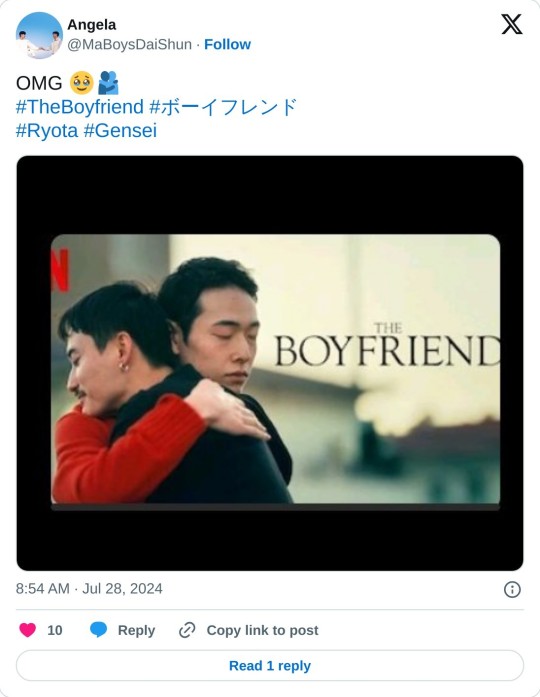
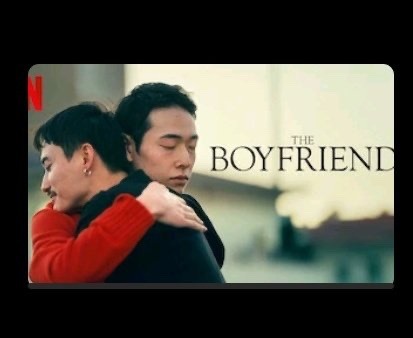
what is happening guys omg ryota might be a mess but fuck it i need them 😭
#gensei looks happy? well kinda sorta but as long as my softie is happy regardless of the outcome imma support him#and ryota what's that face please and they are wearing red and black ASDFGHJKL#idk some of ryo's behaviors still does not sit right with me but after countless rewatch and trying to be aware of the fact that#the show is heavily edited to deliver some narratives i think my guy's gonna have some redemption arc 🙏#the boyfriend netflix#ryota x gensei#sorry but i gotta support my soft spoken dazed and confused gay duo#i'll eat up whatever they'll be offering so bad either that's romance or bromance 🧎🧎
5 notes
·
View notes
Text
TACO'S (POTENTIAL) FRIENDSHIPS TIERLIST
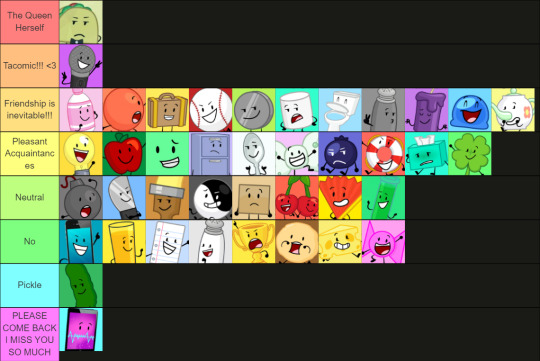
Explanations for my placements! Placements in each row are in no particular order.
Disclaimer: I am a media enjoyer, not a media analyzer. These are just my thoughts, so nothing is objectively wrong, but if one of my takes is OOC or you disagree I’d be happy to hear why as long as you’re nice about it :).
Tier 1: Tacomic!!! <3
Mic: YURI YURI YURI YURI!!!! Their yuri can be un-toxic’d now and that makes me very happy :). Don’t get me wrong, I love toxic yuri, but I’m really glad to see them work things out!!! Mic can be more assertive, and Taco is trying to be better!! Anyways, I do think that they will start out as just friends as they rebuild their relationship and learn how to interact with each other in a healthier way without the competition in the way, and there will certainly be bumps in the road, but after some time I truly believe that we will have yuri. Taco is going to try calming down on the objectively bad stuff she does and work on apologizing when she does mess up!! And Mic can hold her more accountable while also being someone Taco can rely on to stay by her side. Especially with Soap helping out, making sure Taco apologizes rather than avoiding the issue and/or doubling down, and making sure Mic keeps up her established boundaries in terms of not immediately letting Taco off the hook, as she has a bad habit of doing. I love tacomic so so much, and I am 100000% sure that they can work towards and create a healthy and happy relationship that makes them both better people. If you don’t feel like yuri-ing today, you can see them as besties too, but regardless Mic takes the top spot!!!
Tier 2: Friendship is inevitable
Soap: As mentioned above, I think having Soap around will be really helpful for Taco! Someone who doesn’t hold ill-will towards her but is very willing to hold her accountable! A good balance. We saw Soap throwing away her cleaning supplies and telling Mic to listen to her heart, so she’s clearly got some good thoughts on self-improvement! Also Mic has clearly told her about all the non-competition related stuff that she and Taco did, lesbianing around and such, she’s got a pretty clear idea of who Taco is beyond the competition, which can’t be said for most of the cast. And since Taco will definitely be sticking by Mic’s side for the foreseeable future, she’ll get to know Soap pretty well too!! They can do karaoke together!!! Hooray!!!! :D.
Balloon: This one’s pretty obvious, eh? He had his whole redemption arc from when he was a jerk in season 1, and now he sees someone else who wants to start on that journey? He has the chance to help someone in the way Suitcase helped him? FUCK yeah they’re gonna be friends. He even struggled with giving a proper apology as seen in episode 9!! Just like Taco did!! (I love her, but that was the worst apology I’ve ever heard actually). He’s also quite the sensitive guy, which I think could pair well with Taco and her inability to emotion. [Maybe I should make that long post on why I think Taco is autistic. TLDR we have the same kind of autism.] But anyways! I think he could really help her with breaking out of those negative behavioral patterns and turning yourself around! The advice that OJ gave to him would probably work ever better for Taco. A new chance to meet new people who she didn’t do anything bad to! She hasn’t met most of the s2 or any of the s3 joiners, so she has a pretty clean slate with them, even if they’d heard of her misdeeds. I think she would initially think his poetry was stupid, and then find it really relatable and emotional, and then keep pretending she finds it stupid when anyone she isn’t very close to is around. They can talk about the crushing feeling of guilt, regret, and your sins!! They’ve both fucked up and found out, and now Taco is getting on the path to fixing it that Balloon took. Forgiving yourself is an important step to moving past your mistakes, and he could help her with that. Also, despite s3 going with a final 3 rather than a final 2, he did place second vote-wise, so he and Taco can be in the runner-up club together!!! They both enjoy classical music too, as a fun little bit, so they could parallel play (the best way to spend time with someone) together while listening to it!!
Suitcase: Our s2 winner!! And never giving up on anyone QUEEN. Can you tell I love Suitcase yet? Beyond Truth or Flare, they haven’t interacted much, but given the fact that Taco broke in front of her, her kindness, and the fact that she NEVER GIVES UP ON ANYONE (Can you tell I love Suitcase yet?) I think she and Taco could become friends! Girlies who can put things in their heads <3 <3. With Suitcase having become more assertive, in a similar vein to Mic there isn’t a risk for Taco to, for a lack of a better term, steamroll over her. And of course Taco is working to be better, so she would be trying to not to do that anyways! Suitcase is also so sweet and empathetic towards others, I think Taco could benefit from that example! Empathy doesn’t seem to come very naturally to Taco (see that one autistic taco post that I really need to make), but Suitcase could be a great person to learn from, in Mepad’s absence! (Rest in Peace King I Love You). And Suitcase could also work in a similar vein to Balloon and Mepad with getting Taco to be kind to herself. She has a lot of self-loathing after everything, and hasn’t experienced a lot of kindness from others having been alone in the woods for years. Suitcase’s resilience in staying kind despite other’s actions (but standing up for herself when necessary, of course), could be really good for Taco, in the evitable moment that she lashes out. Recovery and self-betterment isn’t linear, you know? And someone like Suitcase who can go to her in these moments still offering kindness, acceptance, and help is vital.
Baseball: The fumbler himself!! He would take Lightbulb’s advice about making sure he’s looking to heart!! And she told him where to look!! At Taco, who is drowning!! He was the lowest-ranked in season 1, so aside from three episodes and the Stupid Trailer, he wasn’t really around for her whole s1 act. He can get to know her as herself, which isn’t something that can be said for most of the other season 1 contestants. I’d also wager he feels partially responsible for her and Mic’s little alliance too, Mic’s own feelings of worthlessness and how he had constantly put her down being the core reasons why Taco chose her and was able to convince her to work together. He’d want to try and fix things with Mic too, and since Tacomic, he’d end up hanging out with Taco too. Besides, he already has a best friend who’s a short lil gremlin, he could definitely get along with Taco. And speaking of Baseball’s short lil gremlin…
Nickel: Hoo boy, I have plenty to say about a Taco and Nickel friendship!! Nickel fucked up his relationships with Suitcase and Balloon big time over not trusting that Balloon actually wanted to be better, and assuming that he couldn’t change. But he has learned his lesson!! Not only has he seen and acknowledged that Balloon changed, apologized to and befriended him, but Nickel changed too!! Hooray!! His ass would not want to make that mistake again. As well, we’ve heard from Brian recently that Nickel low-key admires what Taco pulled off in season 1. Not as much so after his character development, but still, he feels more positively about her true personality than her fake one!! That is not the general sentiment among the s1 cast!! They’re standing next to each other during the concert at the end of the finale, and he even sings backup for her during the reprise of “She Forgot”!. They have clearly already become friends, I’m not taking criticism on this one actually. They’re both sarcastic little shits trying to be better people! Nickel could empathize with the automatic-response-being-something-mean thing!! Also, since Suitcase does not want to see him (valid) he and Baseball should probably make some new friends anyways! Might as well chat with another mostly-alone object, yeah? Sigh. Two mean shorties against the world. On their own there might be a risk of them making each other worse but I think the people around them could keep that from happening. I really love Nico(?) friendship.
Marshmallow: Mepad mourning. They were both the players helped the most by Mepad, they’re mourning his loss the most (other than Toilet, more on him next ;)) and I think they could connect over that, especially with Taco trying to be more open and honest emotionally, just like Mepad was helping her to be, yeah? Her grief over Mepad is a good place to start. They were also some of the first two contestants to realize how bad the game was for those involved and their relationships. Even if it took Taco longer to get there, they end up sharing the same negative view towards the game before the others do! This was even mentioned in the pre-episode 17 stream!! They also both have a complicated relationship with Knife! We don’t get to see too much of how Marsh feels towards Knife after the whole heroic-sacrifice, but I don’t see her immediately being all buddy-buddy with him. And Taco, who is confirmed to care about his well-being don’t argue with me on this one, has the whole thing with him and Mic going, and he might even be more watchful of her as she and Mic continue to patch things up and work towards healthy yuri. Going back to Marsh not totally forgiving Knife, this could help Taco with better understanding how Pickle feels about her. Knife wronged Marsh pretty hard in the past, and even if he’s sorry and has changed, she can still feel hurt and not want to forgive him. And she could vent these feelings to Taco when they’re talking about Knife!! And this is so so similar to how Taco greatly wronged Pickle in the past, and even if she’s sorry and wants to change, he can still feel hurt and not want to forgive her. With lower empathy, it can be really helpful for someone to explain how they feel about something and why, so I think someone more willing to explain a similar situation to her (since Pickle will not be sitting down with her and explaining how he feels) could really help her out in learning to back off and let Pickle live his life even if that life doesn’t include her. Mepad is incredibly proud of both of them frfr Mepad said so in a cameo.
Toilet: Before I start this one I’d like to clarify I will also not be taking criticism here Toico friendship is so very inevitable you don’t even know. I got a cameo from @justin-chapmanswers right after the finale because I was so very sad about Mepad and they confirmed to me that Toilet and Taco could and would bond over missing Mepad. Toico friendship is “so incredibly important” AND I COULD NOT AGREE MORE. He was the only person that they had to care for them and that believed in them for a period of time each and now, even if Taco has Mic back, they’re both missing that bond they had with him because he’s dead (I am so MeSad). Toilet’s persistence with people would also be really important to their connection! Despite how Mephone constantly yelled at and belittled him, Toilet kept going and stayed kind and dutiful to him! And while that did make their relationship unhealthy, I think it could be beneficial to Toico friendship! Taco is trying to change and do better, but as I believe I said previously that’s not linear. She is going to lash out or fall back on old habits at some point, what matters is that she apologizes and keeps trying to be better. She’s not going to apologize to Toilet after years of this treatment like Mephone did, she will, in her process of growth, apologize to him when she knows she’s hurt him, and she will make sure to treat him better. And her doing this consistently when she messes up is key!!! Because Toilet is Toilet, we love Toilet in this house, and he’ll forgive her. And they will talk about how important Mepad was to them, and it will be healing and beautiful. Again I will be taking 0 criticism on this Toico friendship is everything to me actually. She can sit on his head like where he carried the spaghetti in episode 1. Oh no I’m listening to the cameo again and now I am crying /vpos.
Pepper: Yeah i ship tacopep too what are you gonna do about it i want taco to be loved. But more seriously, I think these two could make a really solid connection. Pepper is another one of the season 1 contestants that didn’t interact too much with the fake-Taco that competed in season 1, so there wasn’t much of a connection there to be spoiled. She probably jumped on the hate-train thanks to Salt, but maybe she should spend a bit less time with Salt anyways, yeah? Branch out some more. Which she could do with Taco! Take one look at Taco and tell me she doesn’t love to gossip. Taco and Pepper could probably gossip for hours, I mean, Taco has surely missed a lot of gossip having been outside of the hotel for so long. And Pepper gets to lead the conversation and talk!! Taco does try to take control of situations automatically, but hey, she’s trying to change for the better, and maybe not try to scheme and mastermind quite as much, yeah? And Pepper could do well being more assertive having been made to follow whatever Salt is doing. I think this friendship would need to pick up a bit later down the line for Taco to be in a place where she isn’t trying to take over so often and Pepper to be in a place where she’s not keeping herself attached to Salt, but I do think it could be a sweet and healthy friendship! Also I tend to think of them both as lesbians and sometimes you need a lesbian best friend to discuss Women with.
Candle: Would immediately be able to tell that Taco needs some serious therapy/help. And Candle loves to be needed for therapy/help! Perfect match! But really, Candle managed to tame both Yin-Yang and Silver over the course of a season, she could definitely help Taco out!! And it would be pretty difficult for Taco to keep her true feelings hidden from someone who can tell what’s happening just by looking at her! She would hate that at first but it would be helpful for her. I do think she would dislike Candle’s salt rock thingy though, it would probably just rile her up more. BUT really I think Candle could be a good help to Taco as she recovers. Candle will help everyone after all the stuff from the finale I think, which would not at all be a way to cope with everything. Keeping herself busy. Being needed in the way she was made to need. This isn’t a Candle analysis aaaaaaaaaaaaa.
Goo: My #1 and #3 must be friends, it’s mandatory (my #2 is Mepad, of course). Taco’s miserable and messy self could absolutely use a visit from the cheer factory, and I think she’d get one! I think Goo would be able to take the news of being created by Mephone better than you’d think, honestly. His best friend was created by Fan and Test Tube, so what if they’re created by Mephone, y’know? That just makes them more like his best buddy Bot!! Not being able to be recovered might make him anxious, but that’s just an unfortunate truth that they’re all going to need to get used to. (Unless whatever the Shimmers are giving them is a recovery device. Brian said it’s up to interpretation but i do not want to interpret i want answers!!). Okay, back to Gooco friendship. He’s such a positive, genuine, and sweet little fella it’s pretty hard for anyone not to like him, and that includes Taco!! Someone she not only doesn’t have baggage with, but she has never even met coming to cheer her up? She has had very few positive interactions with others over the years, this is meaningful to her!!! Being around a positive little thinker like Goo could be good for her, AND they are at perfect hugging height for one another. I don’t see Taco giving out too much physical affection but I can very much see her enjoying it even if she won’t admit it. AND AND having lived in the woods for so long, Taco would know the best place to find his beloved pinecones.
Tea Kettle: She already has one little gremlin child in Nickel, what’s another one? Seriously!! I’m not sure if it would exactly be a friendship, probably the more motherly dynamic she has with Nickel, Balloon, and quite a few other characters, but new mom acquired is not a category so she goes here. Taco, who has been living in the woods for years needing to scavenge and steal for food, would enjoy some hors d'oeuvres!! And this would immediately endear her to Tea Kettle, since she loves it so much when people eat her food (adorable). She, like Candle, and probably everyone else at this point, would pretty easily be able to tell that Taco needs some extra TLC, and like the other s3 joiners, doesn’t have anything personal against Taco. Her motherly instincts would immediately kick in, and again such casual kindness and affection for Taco after all this time? Everything. Key to Taco’s recovery and self-betterment. Also, Taco loves tea!!! TK would refill her cup without even being asked <3.
Tier 3: Pleasant Acquaintances
Lightbulb: OKAY OKAY OKAY I KNOW. Lightbulb would be sweet and friendly and silly and herself and would absolutely 1000% consider herself friends with Taco! Them only being acquaintances is fully on Taco. It’s not because she has a personal problem with Lightbulb though! We have heard from the crew (questionnaire after one of the finale screenings, I believe) that Lightbulb reminds Taco a lot of how she used to act in season 1. The earlier she is in her recovery, the harder that would be for her, yeah? There’s also the fact that Lightbulb would have been her choice to partner up with had Mic been eliminated earlier. I like to interpret this as canon, not just on a meta level, that Taco actually had Lightbulb picked as her second choice. With Taco trying to be better, she’d probably feel guilty about that when interacting with Lightbulb, and especially seeing how close she is with her allies friends. They might be able to be actual friends in the future, but in general Lightbulb might be a bit much for Taco. Though I’ll reiterate that Lightbulb would consider her a friend!! And include her in activities and be kind to her!! Because Lightbulb is sweet and lovely like that, the silliest goose of them all <3.
Apple: They’d probably interact a bit because of Taco’s friendship with Marsh, but Apple isn’t someone I’d see her seeking out for companionship, due to her being a little dumb <3. It’s okay we still love her, but Taco might not. She would be nice to Apple, because if Apple is upset then Marsh is upset at whatever caused it, yeah? And because it’s the right thing to do and all, but this latter reason might take a bit longer to kick in as Taco changes for the better.^^ Also, whether or not Apple knows that Taco was acting and isn’t just an entirely different person is still a bit muddled, so that would be a bit weird, yeah?
The Floor: Honestly just a nice, chill guy, don’t think he’d have any issues with Taco. She would see his movement as reminiscent of Mepad’s teleporting, which would give her the blues, but that’s not really Floory’s fault. Another teleporting assistant… Ah, well, my conspiracy can wait for another day. I don’t have too much to say for this pair, to be honest. I think they’d get along okay and everything, I just don’t see them seeking each other out as much as they each would with some others. Oh, they would both like to go on picnics, so that’s definitely a setting in which they’d interact! I do think The Floor and Toilet could be good friends, so they might end up hanging out together if they’re both with Toilet.^^ Besides, I can’t imagine him staying on Inanimate Island instead of returning to Paradise, since it is his home, so he’d stay more connected with the other s3 players rather than the other casts.
Cabby: Honestly Taco would probably be a little jealous that Cabby won. Definitely impressed by her skillful observations of others, though! Taco is observant too, so they could discuss that if they are together, but I don’t think they’d actively seek each other out, like Taco and The Floor. Cabby is also more likely to return to Paradise since that is where her library was, and Taco’s history might make Cabby wary, since she struggled with being seen that way in season 3. I don’t think she’d hold it against Taco in a personal way, but it might dissuade her from really forming a bond with Taco. Overall, I love them both, they could be perfectly friendly with each other, but I don’t really see them forming a strong connection. Earlier season 3 Cabby, though? They could be the power duo of all time. Even post-canon a team up between them would be incredibly skilled and efficient, I just don’t see it as too likely to happen.
Silver Spoon: We already know what Silver thinks of Taco! He thinks she is a Queen and an Icon and he’s right! He would approach Taco the easiest out of the invitationals, and would very much want her approval. I do not think Taco would like him very much. She’d get annoyed by him pretty easily, I think. They’re both British, so that could be a point of interest for him to try and connect for her, but seeing as neither of them are actually from Britain and were just programmed to have a British accent (and like tea!) that might fizzle out. And again the fact that Taco would not be able to stand him. Silver would try to get on her good side by complimenting her act in season 1, which would Not Sit Well with her at all. She would storm away from him and he would be devastated. It might be easier for them to interact if Candle is around to mediate, but I don’t know if they’d get along too well, at least initially. He remains in pleasant acquaintances because he is very pleasant towards her in his own Silver Spoony way, and considers her a friend, but it is one-sided, he is lying to himself <3.
Bot: A split between Goo really liking Taco and Fan and Test Tube not being sure about her. She did shoot and kill Test Tube. And electrocuted Fan. In front of their first child. So yeah not sure their second child would be super keen on being friends with Taco, but they would still be amiable. As a part of the Cheer Factory, they’d join Goo in his cheering up quest, and they could strike up a conversation if they happened to be alone together, but this is another relationship I can’t see either party really seeking out. Their VA is British though, so Bot could probably do a fair impression of Taco. Not that Taco would like that, but y’know, it’s neat, yeah?
Blueberry: He doesn’t make many friends in general, and neither does Taco for that matter. I think combined they could be an absolutely killer duo, could dominate a competition together, but outside of that? I’d say more of a mutual sense of respect for being powerful shorties, but not much of an actual bond. He might be a welcome presence if Taco needs to stew in her negative emotions for a while, as one does, but if she wants to feel better she’d need to go to someone else. Honestly, they might be kept apart on purpose, because those little schemers could probably take over the island together if they really wanted to. But, Taco is trying to change and Mic certainly wouldn’t approve, so she wouldn’t want to. Jury’s still out on Blueberry though. Also, he’s another one I’d see returning to Paradise, less people there, yeah? So their interactions would be limited either way.
Lifering: Nice, friendly guy! He might interact with Taco through Tea Kettle, or through general check-ups. With his medical training, or rather the knowledge he was programmed with, he’d definitely interact with everyone on both islands at one point or another. I wouldn’t imagine Taco being a big fan of such medical check-ups though, with how private of a person she generally is, and that might play into how she views him. He’d definitely do his best not to frighten anyone including Taco, and she would appreciate his work, she just wouldn’t be able to shake the lingering unease surrounding him, and he’d be able to respect that and give her space as long as she needs it. If he found her crying, he’d give her a squeeze and then get someone better equipped to help her, that sort of thing. She might eventually get more comfortable with him, and maybe they could share a plate of hors d'oeuvres, even if I don’t see them forming a super deep connection :) I think they could get along after some time.
Tissues: I think they could have a sort of understanding in Mephone making things difficult for them. He was made to always be sick (fucked up) and she was made to manipulate and hurt people (fucked up). She might get annoyed with him, definitely, but she’d try not to. With the infinite tea generation I headcanon her having, she could pull out a nice warm cup from her shell and give it to him to soothe his sinuses and sore throat, and I think he’d really appreciate that. There’s also an advantage to the fact that they’re only meeting after the big reveal of all the contestants being made by Mephone and running the red line game, Taco’s never been annoyed, hateful, or mocking towards him about his sickness. Tissues is owed a lot of apologies from quite a few cast members, and Taco is actually not one of them! They can also both pull things out of their heads, which I think is cute. That wouldn’t really contribute to a relationship. I just like little guys who can pull things out of their heads!!!^^
Clover: Like Lightbulb, I think Clover would consider Taco a friend! She’d consider pretty much everyone a friend, the sweetheart she is. As Brian once posted, she would find Taco very funny! Taco is trying to change though, so wouldn’t want to be seeing Clover as useful. She might be interested in the luck stuff, but the happy-go-lucky attitude might be a bit much for Taco. Trying to plan for Clover’s luck would be insanely frustrating, since schemes aren’t the only thing Taco could plan(!), and that might turn Taco away from Clover. She’s yet another one I see returning to Paradise, so they wouldn’t interact much, which is probably for the better on Taco’s end. Taco would probably like the butterflies though, because who doesn’t like butterflies, yeah?
Tier 4: Neutral
Bomb: Didn’t really interact with Taco in the first season, despite having been in an alliance with her for a short time, but he is clearly good friends with Pickle, so he wouldn’t be reaching out to her any time soon. Not that I think Pickle would be explicitly telling anyone or even hinting to them not to be friends with Taco even if he himself doesn’t want to, he’s not that kind of guy, but I think Bomb would stick close to Pickle, which means not interacting with Taco much. Yeah, he wasn’t personally hurt by her betrayal or anything, but he mostly knows her as the person who hurt his bestie Pickle, so not exactly keen on her either. Taco would be pretty neutral on him right back, but would be glad that Pickle has made new friends and is being well taken-care of despite everything that went down between them.
Knife: Hoo boy, okay, he is in the neutral category, but feel free to read him as “it’s complicated.” He’s also close with Pickle, seeing firsthand and likely the most of how Taco’s betrayal impacted him, and he was watching over Mic during and after her alliance with Taco, so he isn’t exactly happy with her. But as was confirmed by Brian, so you can’t argue with me on this one, he does care for her well-being. He sees some of himself in Taco. As much as he accuses Taco of projecting onto him in Truth or Flare, they’re really both projecting onto each other. Taco also cares about his well-being!!! (this is also confirmed by brian) Whether or not it’s because he’s someone close to Pickle and Mic, she does care, even if she doesn’t show it. Knife is dead now, too. That might complicate things. Taco though she would be dead forever, and hell, she might have been if Knife hadn’t put pressure on Mephone with Mepad, while Knife spent most of his life thinking of death as meaningless and something that barely even applied to him. One of them survived, and one of them didn’t. They’re such an interesting duo, I really really want to know more of the plan for that body swap episode so so so bad!! Anyone wanna venmo me 30 bucks to get another cameo from Justin so I can fish for info? /j Anyways. Knife would be very wary of her reconciling with Mic and would be watchful to make sure she doesn’t bother Pickle, but he would be proud, in a sense, seeing how she improves. I can’t say he’d help much, as I’m not sure if his tough-love sort of help for people would be super beneficial for Taco, and they’re still not super friendly, but I think they could have a moment of getting along-ness every once in a while. Suitcase might rub off on Knife even more with her never-give-up-on-anyone philosophy, which would lead him to back off on keeping an eye on her a bit more. If anything were to happen to Mic, she would be well protected by these two. AAAAAAAA. Taco and Knife are such an interesting duo, I can’t emphasize this enough. Knife who has already changed, and Taco is who is starting to change. This one has gotten way too long, in short, it’s complicated but more positive than negative post-finale.
Paintbrush: As long as Taco isn’t mean to Lightbulb, I don’t think Painty would feel too strongly either way. Probably unhappy when they find out that Taco shot two of their friends but. They seemed pretty okay with Taco’s presence in act II of the movie, and weren’t incredibly harsh on Taco during the pre-act II stream (if I recall correctly, this one is a bit more blurry tbh) even if they weren’t very pro-Taco either. Didn’t have an extreme reaction to Lightbulb mentioning Taco when they showed up during Truth or Flare either, so that’s another point towards Painty being neutral towards Taco. Might even empathize with how quick-to-anger Taco can be, she could get invited to a painting lesson or something. But really, as long as Taco is civil with Lightbulb (and Baxter), and doesn’t murder Fan or Test Tube again, I think they can coexist without any malice or issues.
Yin-Yang: Yang would like Taco a lot! Yin would be kind of scared of her. Thus, neutral. Yang would admire her sabotage and trickery, which isn’t exactly what she wants to be liked for, but, well, it’s Yang so he’s gonna do what he wants. Yin would be pretty wary of her, and probably avoid her in fear of whatever mischief she and Yang could create with their powers combined. My partner once drew a cute illustration of Yin-Yang stealing and eating a topping out of her head, which I liked very much, and were that to happen I think Taco would dislike Yin-Yang. It would be very rude to eat one of her toppings, especially without asking first. My partner, who I regard as the resident Yin-Yang expert between us, also mentioned them both having a “that-could-have-been-me” sort of connection with OJ, in the sense of how Taco was so close to getting the win that OJ got, and Yin-Yang was so close to getting eliminated instead of OJ. Had it not been for the immunity votes, Yin-Yang would have been the first Thinker out. Had it not been for Bow and all the other chaos that was going down during season 1’s finale, Taco would have been the first winner of Inanimate Insanity. And we know that Yin-Yang and OJ clashed during their residence in the Hotel, and Taco just dislikes OJ after everything, so maybe they could have a little anti-OJ club to get their frustrations out, who knows. Suitcase is still a bit miffed about him eliminating her unfairly that one time, so maybe she could join a little complain-about-OJ session once in a while.
Box: New to the group, so probably doesn’t even find out about Taco’s past for some time, but at the same time she isn’t the most social tool on the shed. And neither is Taco. So I can’t see either one reaching out to the other for a friendship. Box might like that Taco never pretended their corpse was alive, even if it was possibly because she never had the opportunity to interact with Box in general. I might see Taco taking more of the Trophy stance in that she doesn’t see Box’s corpse as alive, which, since it was a corpse, is objectively correct. Albeit with less violence than Trophy handled Box with. They might talk due to both of them being around Suitcase from time to time, but I’d more view them as two relatively introverted people who simply don’t seek a connection with each other. [Also, putting a Box conspiracy here, but does anyone else think her inclusion specifically is why season 2 had an uneven amount of contestants in-canon. Like, the season 2 cast would have been developed before the whole MeLife twist, but on a non-meta level, it was probably Box being included in the cast that made the numbers wonky. 19 contestants? A prime number? What? 18 would make sense, or 20, but 19? Because Box was added in with the actual living contestants, because Mephone couldn’t bring himself to exclude her, which brought the number of players up to 19. Thank you for coming to my TedTalk.]
Cherries: Probably a bit childish for Taco’s taste in friends. And for Cherries, them always wanting a reaction… Well if Taco was pranked, she would not react well, and they might be hard pressed to get her to laugh especially if she already dislikes them due to being pranked. She is quite the actor, so even if she does find a joke or two funny, she’s not gonna break. And then Cherries would get bored of trying to make her laugh, and move on to someone they can get a better reaction from. Unless they try roping Taco into their little schemes before they prank her, then I can see a more positive relationship forming. Either way, I don’t see them as consistently seeking each other out for companionship.
Fan: Taco electrocuted him that one time. So, not exactly a great start. Especially since it was while he was talking to the Shimmers. The Shimmers, one of which was his infant child… A really bad start, then. I don’t see Fan as a very hateful guy, honestly. Passionate, sure, but doesn’t strike me as the type to stay angry for very long. He wouldn’t be approaching Taco for friendship any time soon, and would probably tell Bot that they should be wary around her, but I also think he would respect Taco’s effort to change and let bygones be bygones in the end. Taco probably wouldn’t approach him either, other than apologizing for electrocuting him and shooting Test Tube (she should apologize for that, and Mic would make sure she does). Would probably want to know more about Taco’s strategy and experiences during the first season, but also has the self-restraint not to ask.
Test Tube: Less forgiving than Fan, but would follow his lead in not holding a huge grudge towards her. She wouldn’t trust Taco at all, but she wouldn’t fall into malicious territory like what ended up happening with Cabby. Taco would be wary of Test Tube too, especially after the other apology she gives Test Tube, for breaking into her “secret” lab and stealing things. Testy might actually take that one worse than the apology for murdering her. Despite that, I do see Test Tube letting Taco keep the white invisibow that Mepad was wearing when he was killed. This would probably happen before Taco confesses to murder, assault, breaking and entering, and theft anyways, but I see Test Tube letting her keep it. Random act of kindness while Taco is mourning him, yeah? She is the one who gave him the bow after all. Testy wouldn’t love Taco, and would also warn Bot to be careful around her and come to her right away if she has any problems, but could coexist with Taco.
Tier 5: No
Mephone: Yeah, this is an obvious one. Beyond the fact that he’s left to give the contestants space, at least for the time being, Taco would be pretty damn mad at him after everything. Whether he made them subconsciously or not, he made her to be manipulative and unpredictable and to betray the people she cares about. Thinking further on that, he also didn’t plan anything good for her, unlike other villainous characters. Balloon and Knife both got redemption arcs, Silver got a girlboss, but Taco? She got another “ally” to inevitably lose, years of homelessness and isolation, and not even a million squats. Not to mention his reaction to her during Truth or Flare. Sure, it is reasonable for him not to want to see her, especially with how she acts in the episode, but not wanting to recover her? That’s really fucked up. Seriously. Thank god for Mepad. I can and would very much argue that Taco is the most mistreated contestant by Mephone4. She would not want to see him ever again, and I think if she did see him and he tried to talk with her it would not go well. So, this one is a definite no.
OJ: She and OJ did interact relatively frequently in season 1, and while I’m not sure exactly how betrayed he would have felt by her revealing her true nature, he would not like having been fooled and would very much have not liked her trying to steal his prize. I can’t see them ever really getting along again. Even if Taco does apologize to him (and out of everyone she probably should apologize to, she would hate this one the most), I don’t see that doing much. OJ is another person that saw how her betrayal affected Pickle pretty closely, and he’d still hold at least a little grudge over that. Although, if you take the “built to win” line seriously like I do, (and Brian said in the 700k stream that it was up to interpretation- hah! Vindication! Kind of! Enough for me!!!) their dynamic can be a lot more interesting. And even though I don’t see them ever being friends again, I do see them at some point having a moment in which they both say something like “these guys are all so weird” and then looking at each other awkwardly and proceeding to ignore each other entirely for the next week or so. They’re both drama queens, yeah, but in comparison to some of the other characters they can be a bit more… reasonable? Doesn’t seem like quite the right word. Grounded? Doesn’t seem right either. Hopefully this is still comprehensible, but regardless, these two would not be friends.
Paper: My guy screeched in terror when she was seen in the hotel. I don’t think it’s gonna happen, especially if OJ isn’t befriending her in any way. He wouldn’t be happy about her trying to steal his boyfriend’s prize and is another who got to see Pickle growing depressed after her betrayal, so he’d keep his negative view on her. I don’t think he’d be as scared of her post-canon, especially seeing her trying to avoid violence by Mic’s demand, so I suppose that’s something. I am so very sorry, menu squad fans, I love them too, but I think that ship has long since sailed. I honestly don’t have very much to say for Paper, I feel like he’s a pretty obvious one, though they don’t actually interact that much. He doesn’t like her, and has a boyfriend who really doesn’t like her, so they’re not going to be connecting any time soon. I do think he would feel more sympathetic to her plights than OJ, as the more emotionally intelligent one between them, but would leave helping her to people closer to her.
Salt: Taco would find her annoying, mostly. Especially after she and Pepper become friends, and Pepper vents about some of her frustrations with Salt to Taco, Taco wouldn’t be a fan of hers. Salt wouldn’t like Taco because she tried to steal OJ’s prize, and Salt is all gross and very weird about OJ. There’s a reason why she got the least votes in the latest plushie poll. Even Taco, who doesn’t really like Paper or OJ, would want Salt to back off and tell her to do so even if she had to be a tad aggressive about it. It shouldn’t always have to fall on poor Pepper especially when she starts branching out towards new people and relationships. Taco wouldn't be payjay's biggest fan or anything, but she wouldn't be upset over them or anything. Taco herself is gay. WLW and MLM solidarity!!!!
Trophy: She would beat him in a bunch of stuff (some by cheating, some fairly) and he would hate her like the sore loser of all time he is. She would probably just find him annoying, like a less-tolerable version of Blueberry, maybe. I can see them both getting banned from game night, Trophy because he can’t take a loss and Taco for cheating, of course, and attempting to hang out together in protest. I suppose they could bond that way, but I’d lean more towards them either arguing or getting annoyed with each other and agreeing to never hang out again. Might casually flip each other off in the hallways, not from hatred but from mutual acknowledgment that the other is kind of an asshole sometimes. I think it’s beautiful <3.
Dough: She’d only have to see him when she’s in the mansion, which is definitely for the best. They wouldn’t seek each other out, ever. Taco would find him very annoying, and would hate any and all of his Bow imitating or discussion. She never met him, she does not care about him, and he’d probably feel the same way about her. Not much to say about this one, but I. Well. It’s Dough. I’m so sorry Dough fans but I have never had much to say about him.
Cheesy: Yeah Taco would find him annoying too. He and Mic are on better terms now, so they might sometimes find themselves in the same place, but Taco might soon have to leave that place because she is getting so annoyed with him. He probably wouldn’t dislike her or anything, but he wouldn’t really like her either, seeing as she wouldn’t be the best audience member for him. Poor guy is gonna have to find some new material again, seeing as none of them have mamas and bringing that up is definitely in poor taste at the moment. Yikers. But yeah, another one who will not be friends with Taco because they would be too much for her.
Bow: Taco’s least favorite person! Bow is the reason that Taco lost season 1, and I don’t think Taco is ever going to get over that. (Especially if you interpret the “built to win” line literally like I do~~~). Taco would avoid her like the plague, and probably regard her as a plague on the world too. Would very much not enjoy having to live in the same building as Bow, for however long it takes until they have another building established, since Taco would probably move out the second she could as long as Mic was down to move with her. Anything to get away from Bow. I can not emphasize enough how much Taco hates Bow. Despises her. Would rather stick her arms into a pothole full of piranhas than be in Bow’s presence. That plastic pink headgear is the absolute worst object on the planet to her. Bow doesn’t really care either way. Unless Taco is openly aggressive to her, she’s neutral. But Taco would probably antagonize her at one point or another, so Bow would probably end up disliking her too, just not as passionately.
Tier 6: Pickle
Pickle: Sigh. My fellow Taco lovers. It’s not gonna happen, guys. Pickle and Taco friendship is not going to happen ever again. I KNOW. Taco wants it!! You want it!! I want it too!!! I have been a fan since season 1 was airing, I of all people would love to see them be friends again. But Pickle doesn’t want that, so I’m going to respect it. Taco would probably try apologizing to him once or twice more before backing off, probably being able to do so and really start to move on with the help of Mic, Nickel, and/or Marsh. She does shake her head and move past things during the red line game! It’s a good start! Even if I think she would give it another shot (because in apologizing more she comes to realize how bad her first apology was. Yeesh. Girl I’m your biggest supporter, I am a certified Taco apologist, but damn). But! Regardless of the fact that they’re not going to be friends again, it’s not as though they’re going to be enemies! Taco wants to be better, especially towards Pickle. And as for Pickle, he just isn’t that sort of guy, yeah? He doesn’t want to be friends with Taco or give her another chance, which is fully fair and valid, but it’s not as though he wants her to suffer either!! If she like, fell and broke her leg or smth, he would willingly carry her to get help, yeah? If they both happen to be in the kitchen and she’s struggling to reach something on the top shelf, he’d grab it for her. He’s chill and especially after a longer period of time when he’s been able to heal further and be okay with seeing her around, they could just be… okay. Not friends, but okay. He would show up to the Tacomic wedding.
Tier 7: PLEASE COME BACK I MISS YOU SO MUCH
Mepad: PLEASE COME BACK KING I CAN’T DO THIS WITHOUT YOU. I LOVE YOU SO MUCH YOU SUPPORTIVE ICON. HE IS IN TIER 7 BECAUSE HE IS DEAD AND THAT MAKES ME SO VERY SAD. I MISS YOU SO MUCH MEPAD MY BELOVED MEPAD. I MISS THE OLD SEASON 2 UPLOAD SCHEDULE I CAN’T HANDLE TACOPAD GETTING GIVEN TO US AND TAKEN AWAY WITHIN LIKE 4 MONTHS. GIVE US 4 YEARS AS GOD INTENDED /J. ANYWAYS MEPAD WOULD BE ON THE TIPPY TOP TIER IF HE WAS STILL ALIVE MY WONDERFUL MEPAD YOU WILL BE FOREVER IN MY HEART. ONCE I GET MY HANDS ON YOUR PLUSHIE I WILL MAKE YOU AND MY TACO PLUSH HUG IT IS MANDATORY.
Okay, 13 pages later and that’s everyone! If you’ve read every entry, wow!!! Thanks!!! That’s a lot of reading and a lot of rambles you saw!!! If you skipped to your favorites, that’s also fair!!! Thanks for reading either way!!!^^ I have so very many thoughts about Taco, so it’s nice to get some written out!! :3
#inanimate insanity#taco ii#ii taco#ii mepad#mepad ii#inanimate insanity finale#ii mic#mic ii#ii microphone#microphone ii#soap ii#ii soap#inanimate insanity hc#inanimate insanity headcanon#loomy's rambles#loomy's hcs#balloon ii#ii balloon#suitcase ii#ii suitcase#baseball ii#ii baseball#nickel ii#ii nickel#marshmallow ii#ii marshmallow#ii toilet#toilet ii#ii pepper#pepper ii
169 notes
·
View notes
Text
How to cope with a bad grade (or a grade worse than your expectations)
Hello hello,
Cinna here! I am a third-year neural science major, so, needless to say, I had my share of academic failures. I am sure there are some people who managed to finish college with perfect grades, but, trust me, there aren't as many as you think. It's human to make mistakes! But it's also OK to be upset about your mistakes. Your value is not determined by your grades! Regardless, here are some tips and tricks to get things going after a big whoopsie daisy.
Give yourself some time to process: Does this mean crying? maybe. Blankly staring at a wall? Also possible. Let it sink in. This step can take a long time, don't feel guilty about the time spent. As I said, grades don't define you, and it is not the end of the world. BUT your feelings are valid! You are allowed to feel upset or even disappointed. Give yourself some time to do that but don't let your feelings about the situation define your feelings about yourself <3
Get a treat: Yeah yeah, so you messed up. But I usually allow myself some escapism before getting back on track. Watch an episode you have been waiting to watch after the exams. Get a cookie. Take a nap. Do SOMETHING that makes you secrete some serotonin.
Check your exam: Make sure to learn what you got wrong. It may feel like it is too late now, but it is NOT! Go speak to your TA or professor and learn what went wrong and why. This might be very valuable for the next exams! It also allows the teaching staff to see you are TRYING to improve. This can be a game changer for the final grade when they consider performance grades or if you ask for a recommendation letter.
Game plan: It happened. You faced it, you asked for help, and now it's time to plan how to improve. You don't have to follow each and every step but sketch out things to review and when. This will make you state your intention. Sometimes declaring you are gonna do something is more powerful than you think. It will also help you feel less overwhelmed when you are studying for the next exams.
The redemption arc: Be easy on yourself. A healthy amount of regret can push you forward, but don't let it burn you out. This is a marathon! If you are a stem student like me, chances are you have MANY midterms (too many, absolutely too many). This means you have your chance to fix this. Remember you haven't lost until you stop trying. Go ask for help from your friends. If they are at the same level of knowledge you can cross-examine the content to see if you are missing something. Trying to teach the content also helps you organize it better in your head which helps the learning process. If you are a lone wolf and don't like studying with others, try speaking to yourself aloud (it's not crazy behavior, sush). Stay hydrated and have healthy snacks around! Be consistent and hopeful. I'm sure things will go better during the next midterms. And if not, the other midterms. And if not, the other... midterms... GOd I have too many midterms...
I believe in you, buddy. You got this! Take some chubby pigeons that I found cute as a motivator (they believe in you too).

#studyblr#study motivation#studyspo#chaotic studyblr#study aesthetic#study blog#study notes#studyinspo#chaotic academia#study#studying#student#university#studies#student life#stem student#student mental health#mental health#academic pressure#academic validation#academic victim#academia#stem academia#dark academia#light academia#chaotic academic aesthetic#academic weapon#realistic studyblr#motivation#study motivator
157 notes
·
View notes
Text
Okay, so, I need to talk about the relationship between Persona 5's ending and Persona 5 royal's ending, because I think it isn't discussed enough how one puts into question the themes of the other and in doing so it elevates everything that came before.
Spoilers are coming, you've been warned.
The main thing that's given me an outlet to think about this is a few quotes from the Phantom Thieves when they're in the Velvet Room after being Thanos-snapped by Yaldabaoth. Specifically these quotes:
Ann: "I... I never want anyone to have to go through what I did!"
Yusuke: "Just as art is meant to break boundaries, people should be saved even if they frown upon it. I won't allow the justice I believe in to be shaken any further!"
Ryuji: "We're doin' this to make sure people don't go through the same crap we did. It doesn't matter if they think we're just or not. We gotta do what we believe in!"
Futaba: "I can't let people suffer like this, even if I don't know them personally"
They mention some core ideas: 1. They want to prevent people's suffering because of the suffering they've felt. 2. They must do this regardless of if people want it, because they think it's the right thing to do. 3. Their justice is worth fighting for by virtue of being what they believe in.
Does this seem familiar? Maybe makes you think of a certain therapist who shows up in Royal?
I think Takuto Maruki serves a decent amount of purposes narratively and thematically, but one of the most genius things about him is that he serves as a foil to both the Phantom Thieves and Akechi, and in being that foil, he is, deep down, following the principles that the Phantom Thieves fought for - In the end, it was largely Joker who inspired him to fight for his reality.
Maruki fights for a reality where suffering straight up doesn't exist, because he doesn't want anyone to feel the suffering he's had to endure. Maruki wants the Phantom Thieves and Akechi to never feel suffering anymore, regardless of their stance on the matter. He is "saving" them regardless of their wishes, and will fight them to keep the reality he wants. He thinks the world is unfair, so his "justice" is to make a perfect world for everyone - and that's what makes it worth fighting for, because that's what he believes.
Maruki's rationale to fight against the Phantom Thieves and Akechi is (partly) the same reasoning that the Phantom Thieves use to regain their motivation to fight the Holy Grail/Yaldabaoth.
So, narratively, Maruki serves as a mirror that's telling things not to be told for the Phantom Thieves to look into and to see the ugly parts of their own way of acting. Can they really fight Maruki, knowing that he is just acting how they did?
I see people sometimes refusing Maruki's reality because it "wouldn't actually work" or "it's imperfect". But as far as I'm aware, it's imperfect because it hasn't been completed yet - I think the game is a lot more interesting under the pretense that Maruki truly has the power to erase all suffering, once his reality is complete, past the deadline. I also see the argument, and even the game uses it, that Maruki's world "isn't reality". But did we listen well to Morgana's speech before he disappeared in the Yaldabaoth arc? The world itself is made up of cognition, reality is born from the points of view of everyone. Maruki *can* change reality, and the real question of the game is not about the logistics or "ontological dignity" of his reality, but rather - Do you want a world where all your wishes are granted and no suffering exists?
In the end, the game shows the Phantom Thieves that "sticking to their justice" will make them fight against people with similar ideals as theirs. It's funny, in a way, how Akechi was the one fully willing to fight Maruki from the start. His rebellion has always been more individualistic in nature than the Phantom Thieves' - he wanted revenge for himself, then redemption for himself and now he wants a reality where he isn't under anyone's control anymore. To him, Shido's country, Yaldabaoth's ruin and Maruki's world are all the same - Maruki just has a nicer, more therapy-speaky way of presenting his proposal, and sees people as his equals rather than as insolent masses, but his goal is the same. They're all worlds that shackle you for the "greater good". And in the end, Maruki, and Royal, force the P5 gang to become more like Akechi - to value their individuality in the face of the public's "justice".
To fight for what you believe in you will face people with the same determination as you. They will be your equals in many, many ways. In the end, you can only stick to your guns and hope that what you believe in is worth more than what they believe in.
I have a lot more to write about these topics but I'll leave it there. Maybe about the relationship between Maruki's reality and individuality next? That could be fun ^^
Btw - Special thanks to @thedaythatwas for inspiring me to write up stuff about Persona 5 Royal!
#persona 5#p5#p5r#persona 5 royal#persona 5 spoilers#takuto maruki#dr maruki#p5r maruki#akechi goro#goro akechi#writeup#damn this turned out long as hell
354 notes
·
View notes
Text
I think the thing about Zuko’s arc (and I know I’m not the first to say this it’s just on my mind) is that, from the moment you meet him, this angsty teenager is conflicted. He is unwavering in his pursuit of the Avatar, his reason why, praise and recognition, is steadfast, but the source of that praise and recognition comes from an unstable place.
A lot of failed redemption arcs that I see attempt to redeem a character who does not show remorse and even rejects the notions that they’ve done anything to be remorseful over. They know exactly what they’re doing, they know that it’s wrong, but have justified it to themselves as morally superior, that the ends justify the means and are vindictive about it.
Take Enji Todorki. Hate this man’s “redemption”. Hate it.
I’ve heard that we’re supposed to take Shoto’s flashbacks in season 2 as an unreliable narrator… when that is not at all made clear within the story and Enji is set up just like every other irredeemable asshole in fiction.
Enji, in those flashbacks and in present day within the tournament arc season, acts cruelly without remorse. He is not shown with a single second of hesitation or questioning of his actions, that maybe he’s done something wrong, but is pushing through it regardless. Even his pride when Shoto “behaves” all reflects back on him and how he raised Shoto, not his kid as an independent person.
Zuko is different.
He’s not hunting the Avatar because he inherently believes the Avatar to be evil, and he’s only cruel when he thinks that’s what he’s supposed to do. From day one, this boy shows integrity—he keeps his word to leave the Water Tribe alone when he doesn’t have to—uncertainty in his conversations with Iroh in how he’s desperate to believe he’s right, but not that he actually believes what he’s doing is right.
He's a bit incompetent, too, and that’s part of his appeal. He’s not the best firebender, or negotiator, or tactician. Sokka makes a fool of him when he enters the water tribe and he doesn’t lash out burning people because his pride’s been stung.
So you want to root for him, because he’s not a prideful asshole, he’s a misguided teenager you’re hoping will see the light of day, and Zuko’s cruelties never go unpunished by the narrative.
Enji is handed a ticket to redemption because the narrative says so.
Zuko fights tooth and nail for his redemption, even when the narrative keeps kicking him while he’s down.
I’ll immediately be intrigued by a character who’s done some awful shit, and it’s eating them relentlessly from the inside. Even if they deny it, the narrative shows that they’re not devoutly certain of themselves.
I’ll even take a character who is devoutly sure of themselves, but figures it out on their own how wrong they were, and works with the understanding that they’re not entitled to forgiveness, instead of getting pissy when their one cheap bit of charity doesn’t absolve them of their crimes (or when the forgivers actually buy this BS).
If they’re not even the slightest bit guilty until they suffer consequences for their actions, their “redemption” reads like “X doesn’t feel bad because they know they’re wrong, X feels bad because they didn’t get away with it.”
65 notes
·
View notes
Text
i just came by this post and i had to address it.

wow. that is a controversial take. and an objectively incorrect one.
i'll just preface this by saying that i'm not satisfied with arcane's finale either. i think it completely went against its own message in the end, and a lot of the arcs were resolved poorly.
but this take is still wild. let me break it down one by one:
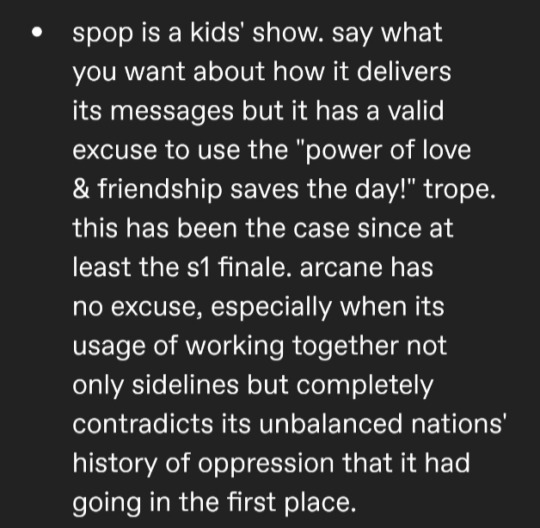
there's nothing wrong with the "power of love/friendship" trope. the only problem is that
1. spop entirely focuses on romantic relationships. fuck familial relationships, fuck platonic relationships, the only thing that matters is romance.
2. most of the ships are either forced with no prior buildup or straight-up toxic.
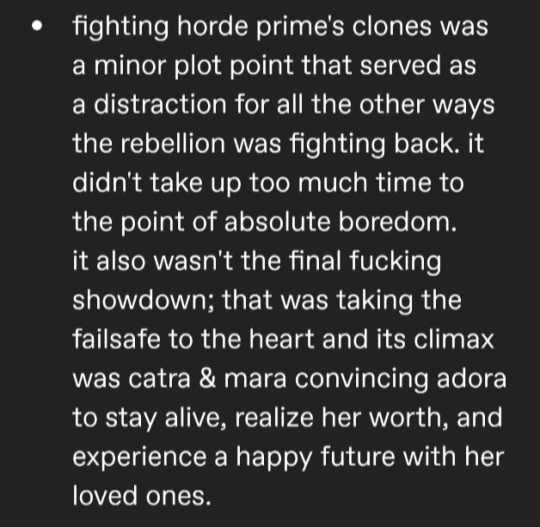
horde prime as a whole was a poorly written villain who was only introduced because catra and hordak were "redeemed". that alone makes the entire finale weak, because horde prime is not as much of a threat as catra was. he's just a placeholder.
i'm convinced that the only reason they introduced the failsafe and the heart of etheria was because horde prime wasn't intimidating enough to keep the audience captivated.
mara convincing adora to stay alive would have been a touching scene if the message wasn't that adora should date her abusive sister.

i'm sorry, did we watch the same show? because how the fuck can you say that catra is no longer abusive after her redemption after watching all of this???
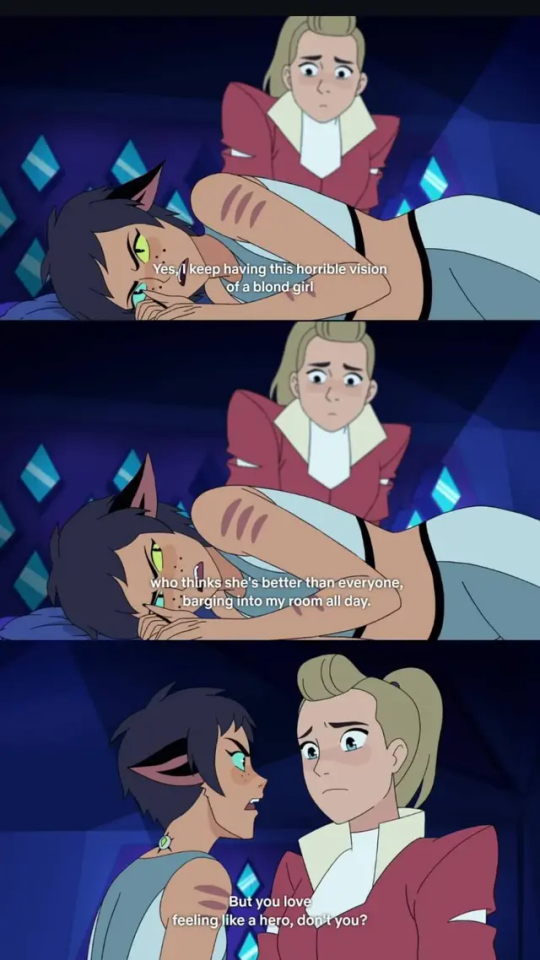
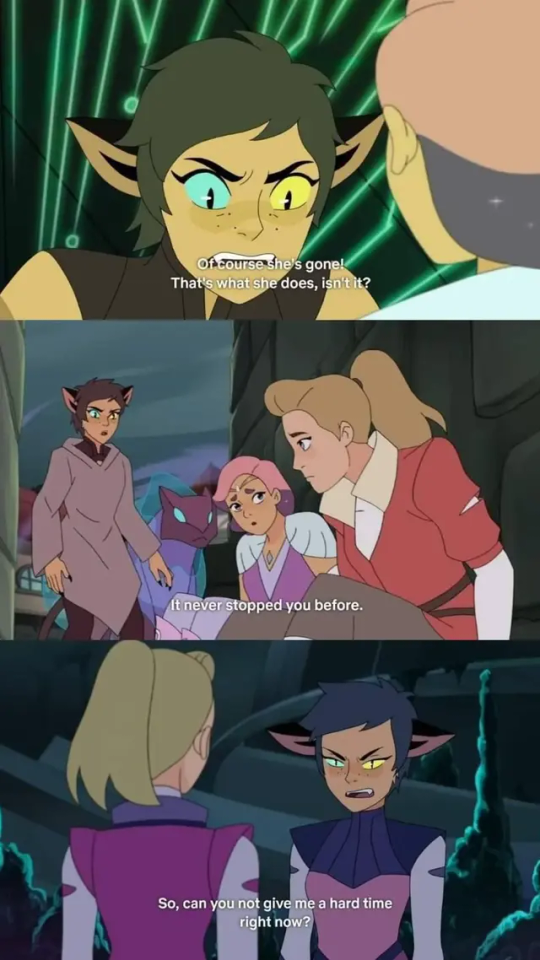
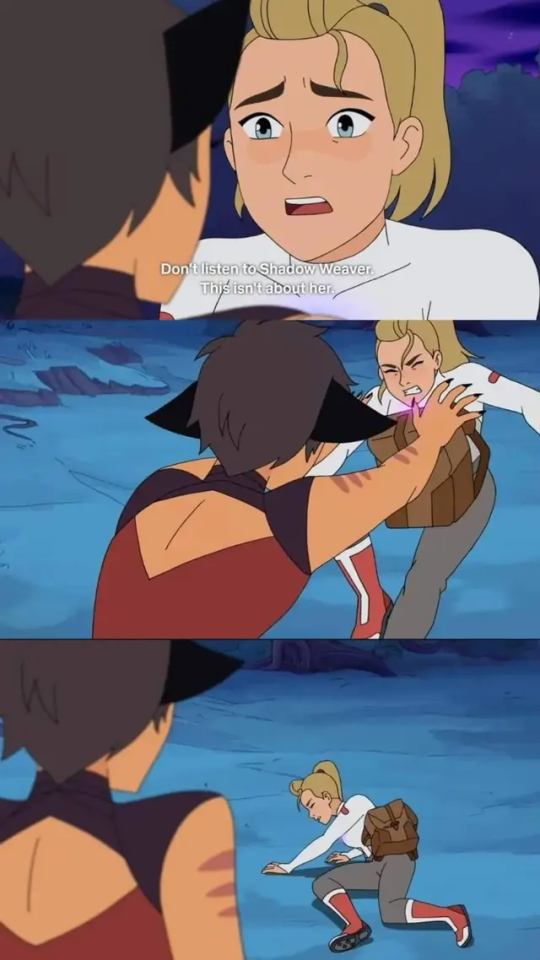
oh yeah, catra pushing adora to the ground and guilt tripping her for trying to save the world wasn't abusive at all. catra constantly screaming at adora for the smallest reasons isn't abusive, that's just catra's little quirk! /s
you would have to be blind to watch all of these instances of catra continuing to abuse adora, and still think that she has changed.
caitlyn hit vi with her rifle, yes, and I'm not going to defend that at all. i agree that it was completely unwarranted, regardless of her reasons. but caitlyn's actions are nothing compared to catra's.
you can love or hate caitvi, i literally don't care. but you can't hate caitvi for being "toxic" while acting like c//a is a healthy ship.
“catra ceased all intentions of being enemies with adora & glimmer and learned to love & fight for etheria”
oh yeah, that's why she kept taking jabs at the princesses and bragging about how many times she has defeated them. that's why she never apologized to glimmer for killing her mother, or to mermista for colonizing her kingdom. oh wait, mermista was very conveniently chipped so that poor catra wouldn't have to deal with all that, right?
let's be real, the only reason catra sided with adora was because she literally had no other choice. she was backed into a corner. she wanted to work for horde prime but since he was willing to throw her out, and the original horde was in shambles, catra's only choice was to join the rebellion. she does not care for the princesses or for etheria.
“catradora never had a power imbalance and fought pretty equally”
this just made me laugh. did this person even watch the show? catra had power over adora 90% of the time.
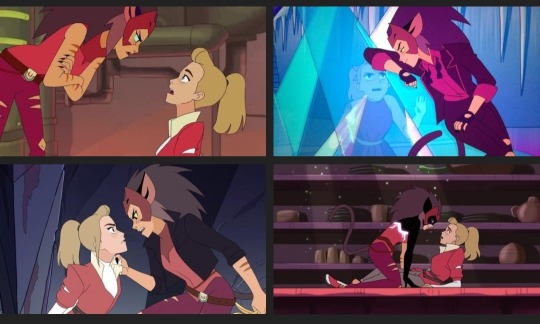
there were very few instances where adora had power over catra and usually in those instances, catra would attack adora in some way to bring her beneath her.
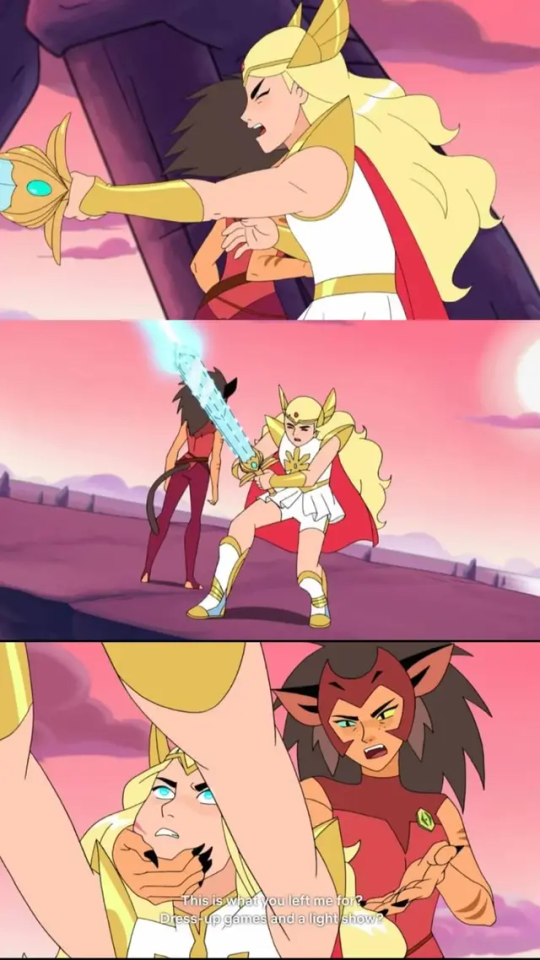
again, i have my complaints with caitvi. i don't think it's a perfect ship and i'm not going to defend the shitty parts of it. but catra has literally used every single type of abuse on adora - physical violence, emotional manipulation, gaslighting, guilt tripping, kidnapping, attempted murder, victim blaming - and y'all still think that caitvi is worse? be fucking for real.
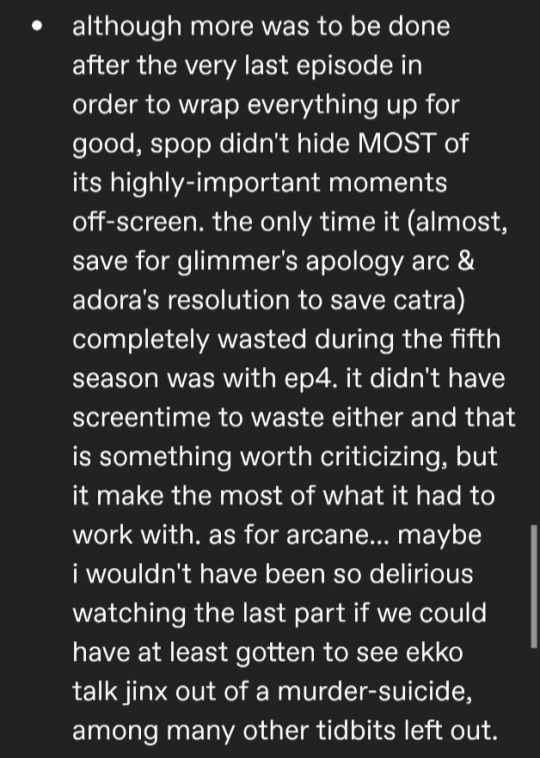
five seasons isn't enough screentime to wrap up arcs in a satisfactory manner? come on. spop had plenty of time, the writers just didn't plan everything out. they absolutely did not make the most of what they had to work with.
they had 5 whole seasons and still decided to shove catra's redemption arc into the final one, completely rushing it and for what? so that adora had someone to smooch?
the conflict between glimmer and adora could also have been handled better. it was a complex situation, especially considering how catra and shadow weaver was the ones driving them apart. it shouldn't have been solved with a simple “i'm sorry, everything was my fault” and “lol it's okay we good now” like???
again, i'm dissatisfied with arcane's ending. i think a lot of the character arcs were sabotaged and there was too much going on in general.
but i don't think anything can compare to the character assassination in s5 of spop. everyone magically forgot about catra's crimes and forgave her; capable characters were suddenly incompetent and foolish so that catra could shine; and adora, who had completely moved on from catra, was now once again catra's doormat.
you can criticize arcane if you want but this post was just stupid. spop's final season was just as bad, if not worse than arcane. at least arcane managed to write a believable redemption arc for jinx within those 9 episodes - something spop couldn't do with five whole seasons.
#spop critical#spop salt#spop#spop discourse#spop criticism#she ra#anti spop#anti catradora#anti c//a#anti catra#arcane#arcane spoilers#arcane season 2#arcane s2#anti stans
62 notes
·
View notes
Text
Why I Deliberately Avoided the "Colonizer" Argument in my Zutara Thesis - and Why I'll Continue to Avoid it Forever
This is a question that occasionally comes up under my Zutara video essay, because somehow in 2 hours worth of content I still didn't manage to address everything (lol.) But this argument specifically is one I made a point of avoiding entirely, and there are some slightly complicated reasons behind that. I figure I'll write them all out here.
From a surface-level perspective, Zuko's whole arc, his raison d'etre, is to be a de-colonizer. Zuko's redemption arc is kinda all about being a de-colonizer, and his redemption arc is probably like the most talked about plot point of ATLA, so from a basic media literacy standpoint, the whole argument is unsound in the first place, and on that basis alone I find it childish to even entertain as an argument worth engaging with, to be honest.
(At least one person in my comments pointed out that if any ship's "political implications" are problematic in some way, it really ought to be Maiko, as Mai herself is never shown or suggested to be a strong candidate for being a de-colonizing co-ruler alongside Zuko. If anything her attitudes towards lording over servants/underlings would make her… a less than suitable choice for this role, but I digress.)
But the reason I avoided rebutting this particular argument in my video goes deeper than that. From what I've observed of fandom discourse, I find that the colonizer argument is usually an attempt to smear the ship as "problematic" - i.e., this ship is an immoral dynamic, which would make it problematic to depict as canon (and by extension, if you ship it regardless, you're probably problematic yourself.)
And here is where I end up taking a stand that differentiates me from the more authoritarian sectors of fandom.
I'm not here to be the fandom morality police. When it comes to lit crit, I'm really just here to talk about good vs. bad writing. (And when I say "good", I mean structurally sound, thematically cohesive, etc; works that are well-written - I don't mean works that are morally virtuous. More on this in a minute.) So the whole colonizer angle isn't something I'm interested in discussing, for the same reason that I actually avoided discussing Katara "mothering" Aang or the "problematic" aspects of the Kataang ship (such as how he kissed her twice without her consent). My whole entire sections on "Kataang bad" or "Maiko bad" in my 2 hour video was specifically, "how are they written in a way that did a disservice to the story", and "how making them false leads would have created valuable meaning". I deliberately avoided making an argument that consisted purely of, "here's how Kataang/Maiko toxic and Zutara wholesome, hence Zutara superiority, the end".
Why am I not willing to be the fandom morality police? Two reasons:
I don't really have a refined take on these subjects anyway. Unless a piece of literature or art happens to touch on a particular issue that resonates with me personally, the moral value of art is something that doesn't usually spark my interest, so I rarely have much to say on it to begin with. On the whole "colonizer ship" subject specifically, other people who have more passion and knowledge than me on the topic can (and have) put their arguments into words far better than I ever could. I'm more than happy to defer to their take(s), because honestly, they can do these subjects justice in a way I can't. Passing the mic over to someone else is the most responsible thing I can do here, lol. But more importantly:
I reject the conflation of literary merit with moral virtue. It is my opinion that a good story well-told is not always, and does not have to be, a story free from moral vices/questionable themes. In my opinion, there are good problematic stories and bad "pure" stories and literally everything in between. To go one step further, I believe that there are ways that a romance can come off "icky", and then there are ways that it might actually be bad for the story, and meming/shitposting aside, the fact that these two things don't always neatly align is not only a truth I recognise about art but also one of those truths that makes art incredibly interesting to me! So on the one hand, I don't think it is either fair or accurate to conflate literary "goodness" with moral "goodness". On a more serious note, I not only find this type of conflation unfair/inaccurate, I also find it potentially dangerous - and this is why I am really critical of this mindset beyond just disagreeing with it factually. What I see is that people who espouse this rhetoric tend to encourage (or even personally engage in) wilful blindness one way or the other, because ultimately, viewing art through these lens ends up boxing all art into either "morally permissible" or "morally impermissible" categories, and shames anyone enjoying art in the "morally impermissible" box. Unfortunately, I see a lot of people responding to this by A) making excuses for art that they guiltily love despite its problematic elements and/or B) denying the value of any art that they are unable to defend as free from moral wickedness.
Now, I'm not saying that media shouldn't be critiqued on its moral virtue. I actually think morally critiquing art has its place, and assuming it's being done in good faith, it absolutely should be done, and probably even more often than it is now.
Because here's the truth: Sometimes, a story can be really good. Sometimes, you can have a genuinely amazing story with well developed characters and powerful themes that resonate deeply with anyone who reads it. Sometimes, a story can be all of these things - and still be problematic.*
(Or, sometimes a story can be all of those things, and still be written by a problematic author.)
That's why I say, when people conflate moral art with good art, they become blind to the possibility that the art they like being potentially immoral (or vice versa). If only "bad art" is immoral, how can the art that tells the story hitting all the right beats and with perfect rhythm and emotional depth, be ever problematic?
(And how can the art I love, be ever problematic?)
This is why I reject the idea that literary merit = moral virtue (or vice versa) - because I do care about holding art accountable. Even the art that is "good art". Actually, especially the art that is "good art". Especially the art that is well loved and respected and appreciated. The failure to distinguish literary critique from moral critique bothers me on a personal level because I think that conflating the two results in the detriment of both - the latter being the most concerning to me, actually.
So while I respect the inherent value of moral criticism, I'm really not a fan of any argument that presents moral criticism as equivalent to literary criticism, and I will call that out when I see it. And from what I've observed, a lot of the "but Zutara is a colonizer ship" tries to do exactly that, which is why I find it a dishonest and frankly harmful media analysis framework to begin with.
But even when it is done in good faith, moral criticism of art is also just something I personally am neither interested nor good at talking about, and I prefer to talk about the things that I am interested and good at talking about.
(And some people are genuinely good at tackling the moral side of things! I mean, I for one really enjoyed Lindsay Ellis's take on Rent contextualising it within the broader political landscape at the time to show how it's not the progressive queer story it might otherwise appear to be. Moral critique has value, and has its place, and there are definitely circumstances where it can lead to societal progress. Just because I'm not personally interested in addressing it doesn't mean nobody else can do it let alone that nobody else should do it, but also, just because it can and should be done, doesn't mean that it's the only "one true way" to approach lit crit by anyone ever. You know, sometimes... two things… can be true… at once?)
Anyway, if anyone reading this far has recognised that this is basically a variant of the proship vs. antiship debate, you're right, it is. And on that note, I'm just going to leave some links here. I've said about as much as I'm willing/able to say on this subject, but in case anyone is interested in delving deeper into the philosophy behind my convictions, including why I believe leftist authoritarian rhetoric is harmful, and why the whole "but it would be problematic in real life" is an anti-ship argument that doesn't always hold up to scrutiny, I highly recommend these posts/threads:
In general this blog is pretty solid; I agree with almost all of their takes - though they focus more specifically on fanfic/fanart than mainstream media, and I think quite a lot of their arguments are at least somewhat appropriate to extrapolate to mainstream media as well.
I also strongly recommend Bob Altemeyer's book "The Authoritarians" which the author, a verified giga chad, actually made free to download as a pdf, here. His work focuses primarily on right-wing authoritarians, but a lot of his research and conclusions are, you guessed it, applicable to left-wing authoritarians also.
And if you're an anti yourself, welp, you won't find support from me here. This is not an anti-ship safe space, sorrynotsorry 👆
In conclusion, honestly any "but Zutara is problematic" argument is one I'm likely to consider unsound to begin with, let alone the "Zutara is a colonizer ship" argument - but even if it wasn't, it's not something I'm interested in discussing, even if I recognise there are contexts where these discussions have value. I resent the idea that just because I have refined opinions on one aspect of a discussion means I must have (and be willing to preach) refined opinions on all aspects of said discussion. (I don't mean to sound reproachful here - actually the vast majority of the comments I get on my video/tumblr are really sweet and respectful, but I do get a handful of silly comments here and there and I'm at the point where I do feel like this is something worth saying.) Anyway, I'm quite happy to defer to other analysts who have the passion and knowledge to give complicated topics the justice they deserve. All I request is that care is taken not to conflate literary criticism with moral criticism to the detriment of both - and I think it's important to acknowledge when that is indeed happening. And respectfully, don't expect me to give my own take on the matter when other people are already willing and able to put their thoughts into words so much better than me. Peace ✌
*P.S. This works for real life too, by the way. There are people out there who are genuinely not only charming and likeable, but also generous, charitable and warm to the vast majority of the people they know. They may also be amazing at their work, and if they have a job that involves saving lives like firefighting or surgery or w.e, they may even be the reason dozens of people are still alive today. They may honestly do a lot of things you'd have to concede are "good" deeds.
They may be all of these things, and still be someone's abuser. 🙃
Two things can be true at once. It's important never to forget that.
#zutara discourse#the colonizer argument#anti anti zutara#text post#long post#anti maiko#anti mai#tagging just in case#anti purity culture#this is not an anti-ship safe space
306 notes
·
View notes
Note
Nutmeg Tiger × Smoked Cheese headcanons?
Chat, what emojis do we use for this ship? 💨🐅? 🌫️🐯? Help plz
BurningCheese is a slow burn romance (w/ additional slow redemption arc for Spice) in my main canon. SmokedNutmeg is the same thing on so many steroids that they can't even set foot within the country HOSTING the Olympics lmao
Final bosses of tsunderes, clash of titans fr fr
Denial x1000 for 10,000 years. Everyone around them becomes aware of their little crushes on each other before they themselves do. And then it's getting angry and denying it when asked/accused, until they both individually have a lightbulb moment and go "oh for fuck's sake"
Hardly anything changes at all when they eventually do get together. Same old tsundere behavior. Same old smartassery from Smoked Cheese. Same old brashness and short temper from Nutmeg Tiger. They just also hold hands and sit really close to each other as well lol
Smoked Cheese is the more bold/forward one. In those moments where they stop being their usual selves and bickering, he'll use that wit of his to think of something charming/flirty to say to her (and then say something about the color red suiting her after all, with how red her face always gets when he compliments her lol)
Nutmeg Tiger is awful with words. Absolutely awful. She can barely even get out that she thinks Smoked Cheese is handsome. But it's fine; he understands her and her body language (which is how she conveys her thoughts and feelings first and foremost) well enough to know what she means.
They are both surprisingly patient with one another, even if it may seem like the opposite on the surface (you HAVE to be patient if you're dating someone like either of them lmaoooo)
Smoked Cheese knows all the places Nutmeg Tiger likes to be scratched and will scratch them if asked (as in, she nudges him in a particular way, because again. Bad at talking). She likes being scratched behind the ears and under her chin in particular; he takes advantage of this and cuts her off mid-sentence by giving scratches out of nowhere when he wants to one-up her/shut her up immediately (it always works and she hates it)
Sleeping next to each other is a little bit of a hassle due to Nutmeg Tiger being a centaur. She usually just curls up in bed/on the ground like a normal tiger would and Smoked Cheese just leans against her
They will only kiss if they think no one is looking at them, they're both too shy proud to even consider PDA beyond maybe holding hands (but even that is a lot)
Mozzarella keeps asking them about the wedding so she can help plan it. She is only half-joking when she does this. No, neither Smoked Cheese nor Nutmeg Tiger appreciate it regardless
(I have a couple of short stories planned for them, just give me some time to write them out. I actually do like them a lot haha)
#cookie run kingdom#nutmeg tiger cookie#smoked cheese cookie#smoked cheese x nutmeg tiger#merchant asks#smoked cheese crk#nutmeg tiger crk
62 notes
·
View notes
Text
Arcane and Macbeth, and what this means for Caitlyn, Ambessa, Jinx, and Isha Theory
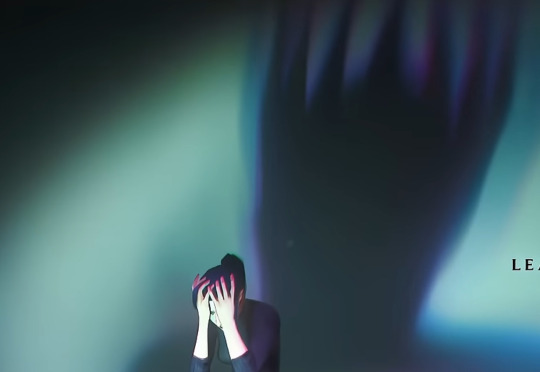
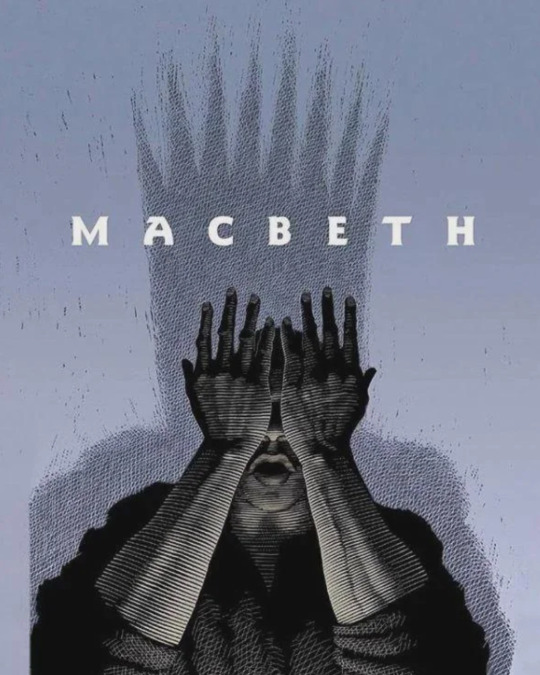
Somebody on Reddit mentioned that this image from the season 2 intro of Caitlyn looked like a Macbeth poster. Obviously I wasn’t the first to notice this, but I did decide to make this post explaining what this means.
Caitlyn being in the position of Macbeth immediately tells us something- She’s in a position of power. One she feels guilty for being in- The guilt eating her alive. After killing King Duncan, Macbeth begins frantically washing his hands in water, and comes to a sudden realization that becoming king comes with the cost of guilt for the unjust way he obtained his power-
“Will all great Neptune’s ocean wash this blood clean from my hand? No, this hand will rather the multitudinous seas incarnadine, making the green one red” (Act 2 Scene 2) the literal meaning of this quote is that no amount of water can wash the blood off his hands and that his attempts to clean himself would turn the entire ocean red. Taking this metaphorically, he’s saying he’ll never be free of his guilt and anything he does to try and save himself would just poison the world around him.
I see people wondering if Caitlyn will have her own “pitfighter Vi” moment. I think the Macbeth symbolism is proof she will. Following the parallels, Caitlyn will act in ways to try to rid herself of the guilt she feels for hurting Zaun, and for hurting Vi. Whatever she does in an attempt to rid herself of guilt will backfire and hurt the people closest to her, and Piltover as a whole.
Based on LoL lore and the fact Caitvi are canonically together by then, I have a hard time believing Caitlyn won’t get an onscreen redemption arc, meaning her similarities to Macbeth end there. However I think this could still give us insight into how Ambessa, Jinx and Isha will fair the rest of the season.
I’ve already seen people compare Ambessa to Lady Macbeth, given that she’s the pulling the strings, the one who convinces Macbeth to kill King Duncan and take the throne. Lady Macbeth goes mad of grief throughout the play. Act 5 Scene 1 shows her sleepwalking and revealing the truth as she speaks. This could possibly indicate that Ambessa herself isn’t as unfazed as she first appears to be, and will reveal the truth through an unintentional admission of guilt. I personally don’t see Ambessa doing this, but I thought I’d mention it regardless since I’ve seen others draw parallels.
Now, something I haven’t seen mentioned at all is that there’s one key thing stopping Macbeth’s future lineage from becoming king: A vision that Banquo’s children will become the future kings of Scotland. After obtaining power, it becomes Macbeth’s mission to eliminate Banquo and his son- A parallel I think best suits Jinx and Isha. Jinx has become the defacto leader of Zaun and represents every bit of grief Caitlyn feels. By killing her- She solves “the problem”. But if Jinx became leader in place of Silco, her father figure, who takes Jinx’s role? Logically, a child who looks up to her. enter Isha, the stand in for Banquo’s son.
In the play itself, Banquo is killed, but his son survives. Do I think this means Caitlyn will succeed in killing Jinx, but not Isha? I can’t say. I feel as if these parallels exist solely to set up the way Caitlyn feels/reacts in Act 2 as opposed to a step by step instruction on how the plot will move forward (Hence why I’m hesitant to claim Ambessa revealing the truth as akin to Lady Macbeth seems like a stable idea- It does not). I do however think there is intentionality behind adding in Macbeth symbolism, and I fully believe that some parts of the play will parallel with the plot of season 2.
68 notes
·
View notes
Note
How did Oda leave such a strong impression on Dazai?
OOHH ok i have a lot of thoughts on this topic so bear with me, this is gonna be a long one My interpretation is the first thing Dazai latched onto about Oda was his honesty.
Oda is a very straightforward person, he rarely ever if at all has an ulterior motive and it totally blindsides Dazai. He can't manipulate Oda because he'll take what he says too literally, he can't predict him - not because Oda is good at hiding his thoughts, he just naturally has the most unreadable resting poker face imaginable - and no matter what he does nothing seems to phase Oda (keyword "seems", it often does he just doesn't show it) , and it intrigues Dazai.

As seen with Chuuya we know Dazai gets hooked on people who surprise and/or impress him, so I can absolutely understand how he saw the enigma that is Oda and said "you're my friend now we're having soft tacos later <3".
I could go on for hours about the various times Oda has bamboozled Dazai and how each effected him profoundly in so many different ways, but that's a discussion for another time. I don't think just these factors would realistically warrant Dazai's drastic change in world outlook and spur on his sudden redemption arc, so what did?
I believe it was his complete lack of judgement. Despite Dazai's constant suicide attempts and harsh view of the world not once did Oda outwardly judge him for it, which is in some ways a blessing and in some ways a curse. Oda never viewed himself as qualified enough to call Dazai out, which in hindsight might've done harm as there were times were Dazai needed someone to call him out, but unbeknownst to Oda that lack of judgement gave Dazai room to breathe.
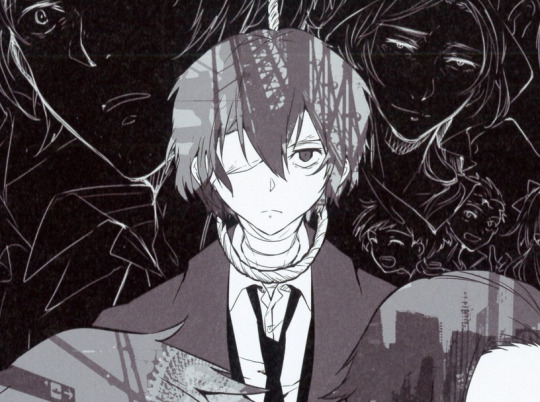

He saw right past the silly facade and the darker side to Dazai, he saw a "sobbing child abandoned in the darkness of a world far emptier than the one we're seeing", and he saw a friend.
And this is exactly why Oda's last words hit Dazai so hard. Odasaku, who never speaks up for himself, Odasaku, who's so genuine he'd believe a murderer if they simply said "I didn't do it", Odasaku, who is now telling Dazai life might just be little better if he decides to help rather than hurt.
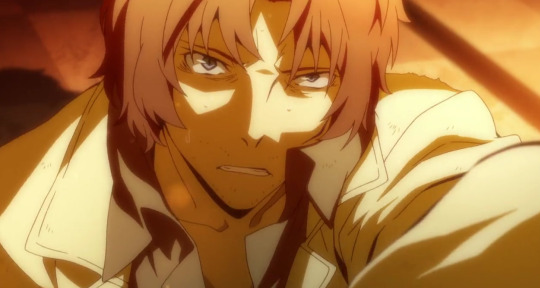
Bleeding out on the floor of a mansion, in a desperate attempt to make up for all the times he didn't confront Dazai Oda has to find some way to get through to him and fast. His harsh words to Dazai on how he'll never find that happiness he so desperately craves are so jarring they snap him out of his panic, suddenly he's blindsided all over again, and that vulnerable state gives Oda's next words the chance to reach deeper - "be on the side that saves people."
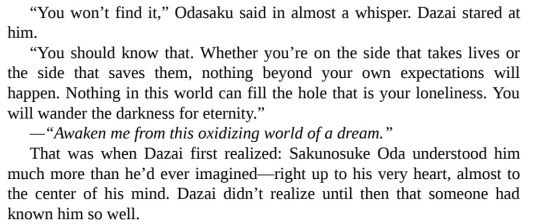
In order to truly get through to him, Oda needed to level with Dazai, the only way to do that in such little time was to repeat back to him his own internal mantra of "never filling that hole that is his loneliness". It's clear his words are false, especially the line "nothing beyond your own expectations will happen" as Dazai's entire speech to Fyodor in the prison is about his belief in the unpredictable nature of human beings.
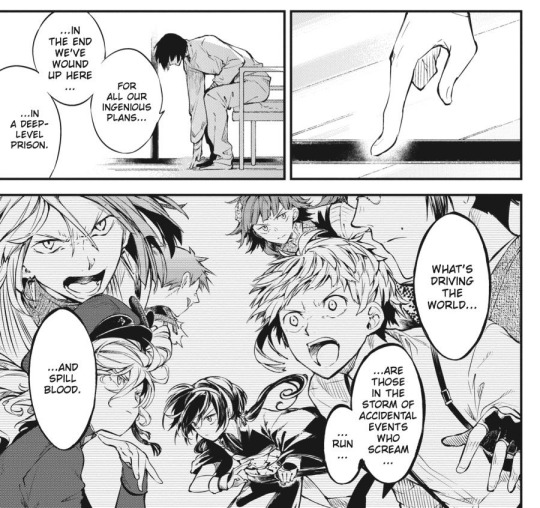
But regardless, that slap in the face of hearing his own self-destructive thoughts voiced aloud after going his entire life without ever considering anybody else could understand them heightened Dazai's faith in Oda's promise of a life that's "a bit more wonderful."

What makes me adore Oda and Dazai's friendship so much is how grounded and natural it feels. Oda isn't some perfect saviour who always knows exactly what to say, far from it, he was a 23 year old PM grunt with 5 kids and a love for spicy curry, but that's all he needed to be.
Sorry this is so ramble-y and long winded if you couldn't tell already Oda's my favourite character so I have a lot to say about him 😭 Thank you so much for the ask!!!
#there are a thousand other points id love to make here but i didnt want it getting any longer than it already is lmao#bsd#bungou stray dogs#bsd analysis#bsd dazai#bsd odasaku#the dark era#dazai osamu#oda sakunosuke#ask
188 notes
·
View notes
Text
TOH Fans Don't Know What Redemption Is
TL:DR: TOH as a show uses the tropes and veneer of redemption a lot but fails to actually engage with the fact that redemption is not about no longer being a dick. Your kind of a dick friend does not need to be redeemed for calling you names, they just need to stop calling you names. No, redemption is about making up for past sins... Which TOH never does.
You do not go to confessional to tell someone you did something bad and then ask them to forget about it. You go there to be told what you must do to be redeemed in the eyes of the Lord or to be assured that there was no sin in the first place. If there was, you are asked to perform a service, even if just a set of prayers, to make up for your slip in faith and show your devotion to the path of good. You sacrifice your time and seek to do better. That is inherently a part of redemption. I frame this religiously but hey, if you get rowdy in your buddy's house when they asked you not to and you break something of theirs, you don't just apologize. You usually actually try to make it up to them if you can because otherwise all you've done is give them words when it's actions that spoke for your disregard to them. You might even ask what you can do to make it up to them.
For an absolutely classic and genuinely amazing example of this: Megamind. In the middle of his arc, Roxanne makes it clear that what Megamind has done has hurt her. Hurt what she cares about. That it has made her world worse. What does Megamind do? He returns the art, he cleans up the city... In his own way and in general UNDOES HIS CRIMES. In that one moment, he stops being selfish and actively attempts to make up for it for someone else by righting his wrongs. The worst you can say is that he's doing it because he likes someone and wants their affection but like... Yeah, that's the motivation to change and Megamind even admits himself that he's finding doing good to be enjoyable now. It's a powerful moment because it so clearly contrasts who he was in a way that would be impossible if he were not seeking redemption and being redeemed.
The ONE TIME TOH actually manages this is Lilith. She recognizes that cursing her sister was wrong. She recognizes that her attempts to be the most powerful person on the Isles was wrong. As such, her betrayal of Belos is NOT her redemption. If she chose to betray Belos because she personal gain in it or saw that it was a dead end in life, it would not be redeeming (this will come up later). Instead, she is truly redeemed because she gives up potentially everything but especially her ability to be above others and her sister by taking the curse unto herself. By sharing that burden she was responsible for first and acknowledging that what she did, specifically, was wrong.
People don't champion Lilith though as some great redemption, do they? Not when it comes to TOH. She's overshadowed by the ones given more of a to do like Hunter, Amity and The Collector. Especially those first two though. So, how do they manage?
Amity has crimes. She bullied Willow when she did not have to as Odalia's demand was ONLY to stop being friends with her. She bullied Willow regardless. She attempted to murder Luz. She tried to remove Luz's ability to use magic and was overall just a general bitch who was more than happy to keep taunting Luz for entertainment. She is genuinely a fucking AWFUL human being at the beginning of the series. Does she even bother recognizing this?
No. Not with more than words. That's all Willow gets. In fact, Amity is so disinterested in making up for being a bitch to Willow that she ignores EVERYTHING about her for almost an entire season after they 'make up' which they only make up with words. Amity just says the right thing and seems to think that's all it takes. She still uses Willow for her own selfish needs in Falls and Follies and she doesn't respect Willow during Labyrinth Runners. She does literally nothing to actually redeem herself for this.
How about refuting Boscha or her mom? Those are pretty big deals and against her old self, right? Well, yes and no but we need to interrogate the why for that. To the audience, it is meant to signify Amity giving up her past influences to be a better person. As I stated at the top, it is a common trope in redemption arcs which TOH does engage with. However... She's doing them for Luz and not because of the past. She tells Boscha to go fuck herself not because Amity was a grade A bitch with Boscha but because Boscha is now bullying someone she cares about so she can dropped just as fast and brutally as she did Willow in the past for the sake of pleasing someone else. NOTHING about her behavior is different except now she's doing it for someone as good. That's not redemption. We don't praise the Punisher here just because he murders bad men. Odalia is similar. It's not to make up for Odalia's influence or the things she did because of Odalia, it is to selfishly proclaim her own personhood... And more importantly, save her girlfriend. It's not even to make up for the expulsion, it's JUST to keep Luz alive. Yes, she gets them unexpelled but only once she first acts for the sake of Luz not dying. She has NO INTEREST in getting involved until then and at that point, it's not her crime, it's Odalia's. That's what makes her motivation being Luz not work because the motivation might be Luz, but the result isn't her facing her past, it's just facing a cartoonish villain.
And if your argument is "Well, all she did was because of Odalia," I would respond with, "Okay, that not a redemption then, that's just a regular character arc." If your character does not actually try to IN UNIVERSE redeem themselves, how can you call it a redemption arc? Sasha is ready to DIE for all of Wartwood to make up for the fact that they're gonna get wiped off the face of the map because of her. She acknowledges that she was wrong and always wrong and goes out to do something about that. She gives up command to Anne in order to try avoid her old mistakes because she is so actively trying to do better than she used to. Redemption is never easy and requires shit like this. The best way to do it fast is, well... Death.
This is why the heroic sacrifice trope is so beloved for redeemed villains. They go from spending an entire life causing misery and being selfish to making the ultimate sacrifice against that which they stood for. In one moment, they seek that redemption... But expect no reward which only further bolsters how this is redemption. Redemption is selfless. You never HAVE to redeem yourself. You never expect a prize or even a better life from redeeming yourself besides being able to sleep better at night. It's a powerful trope...
And Hunter's version of it is literally the worst example I can think of for the trope. Yes, we technically get him rescuing the Emerald Entrails before this as a moment of redemption but what about just redeeming his time under Belos and as the Golden Guard? Well... Essentially no one even gets more than a token apology for that. He just sob stories his way into people's hearts instead of actually do anything to earn their affection outside of Willow KIND OF. But hey, that should be fine since he does sacrifice his own life, right?
Well, again, context. What does he sacrifice for? Because it's not anyone other than him. Just listen to literally the words he's saying. He talks about how much better his life is now. How much he likes the perks of being a good guy like friends. He barely remembers to include that stopping Belos needs to be a part of this without him just looking like a mooch of a friend because he never mentions how it feels good to help people, how he hates what he did with the Emperor or even that he believes more in self expression now. It's ENTIRELY selfish. He doesn't even expect to die, he's just telling Belos to go fuck himself and ends up dying in the process, which is actually pretty normal for a selfish henchman betrayal it's just that the show doesn't realize that's what he's doing.
This is indicative of the show's approach to redemption as a whole and we even get a thesis statement on that. The Collector. If you just say you're sorry and are on the correct side, you're redeemed! Making up for all the damage you did when you absolutely can fix it in like a week? Actually putting yourself up for punishment by those who's autonomy you took away and then tortured? Fucking ANYTHING besides unpuppeting people that he did for months to terrorize the entire Isles? No. He said he's sorry and he's just a goofy little guy so he's redeemed! Right?... Right?
And then the Collector takes this very basic idea of redemption, of just needing to show a bit of kindness and people will magically change, and applies it to Belos. For only the second time, in the whole series, does it not work. The problem with saying that means the show understands this topic and has nuance is... The other example is Kikimora. Neither of these characters are people. They caricatures of villains. They're so pure evil that the idea of redeeming them is, well... A joke. Literally, in the show, the attempt to redeem Belos is a joke. Why would you think the baby eating psycopath was just going to need a hug? That is the level of cartoon villain we are dealing. That's not nuance, it's bullshit, which is why it has never functioned as a critique of SU like it clearly is, especially not when the person who does it JUST NEEDED A FEW KIND WORDS. Like the Collector literally IS just the arc they describe and then try to mock and never even blinks at this fact.
But we call these redemption arcs because they were tokenly villains before hand. I would at this point argue that we need to stop doing that. If we think TOH even purports the concept of redemption, that implies you can learn how to write redemption through TOH. You can't. Bluntly, you cannot because it barely ever tries and when it fails, it fails miserably.
The Diamonds at least promised, and kept their word, to undo their damages. I don't think you get to mock that with your redemptions when you can't even manage that much 75% of the time. See you next tale.
======+++++======
I have a public Discord for any and all who want to join!
I also have an Amazon page for all of my original works in various forms of character focused romances from cute, teenage romance to erotica series of my past. I have an Ao3 for my fanfiction projects as well if that catches your fancy instead. If you want to hang out with me, I stream from time to time and love to chat with chat.
A Twitter you can follow too
And a Kofi if you like what I do and want to help out with the fact that disability doesn’t pay much.
127 notes
·
View notes
Text
Subtext and Culture, Young Royals, Season 3, Episode 4
Last episode ended with Simon coming home to a smashed window, this episode starts the morning after, Simon takes the bus to school, while Wilhelm is anxiously waiting for him.
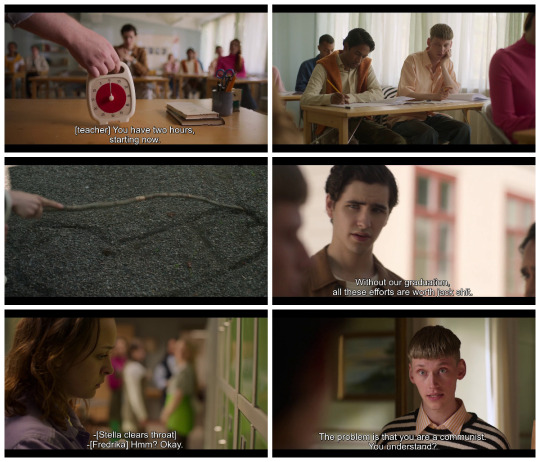
Culture: At a high school level in Sweden, there's national tests in Swedish, English, and Math. Like everywhere else, the purpose of these tests is not only to grade students, but to align all schools across the country to combat grade inflation.
Blink and you miss it: Vincent is trying to cheat by looking at Nils' answers.
Blink and you miss it: Vincent draws a dick in the gravel while waiting for the others to be done with the test.
Subtext: This entire episode is overflowing with examples of privilege. For Vincent, and many other rich kids like him, studying and learning doesn't matter, they'll graduate regardless, so he doesn't care about the exam, he only cares about the graduation party.
Cinematography: Even with Felice and friends being completely blurred out in the background, you can still see Stella and Fredrika turning to look at Sara, and then turning their backs on her.
Culture: In the US, a lot of people are using "socialism" as a catch-all phrase which means politics they don't agree with, regardless of its actual ideology. Likewise, in Sweden, a lot of people use "communist" in the same way about generally left-wing politics, which is what Vincent is doing here.
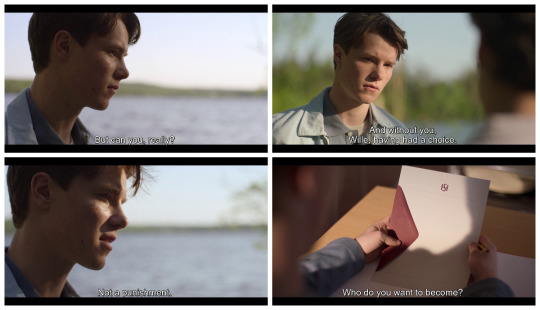
Subtext: Wilhelm asks Simon if he can reconcile the conflict of dating a royal while being anti-monarchy, but the real question is of course if Wilhelm can reconcile the conflict in himself.
Subtext: This is where the show's political stance shines through, and this argument, that Wilhelm wasn't allowed to choose his life for himself, is the main argument they're gonna use in the finale.
Subtext: Wilhelm is weakly defending the monarchy, but just ends up repeating what his mother told him; it's a privilege, not a punishment, but does he believe it himself?
Subtext: The letter-to-yourself plot is mainly there in order to help August along his redemption arc, but here the show is using it to reinforce the point of the previous scene. Who does Wilhelm want to become? Does he have a choice?
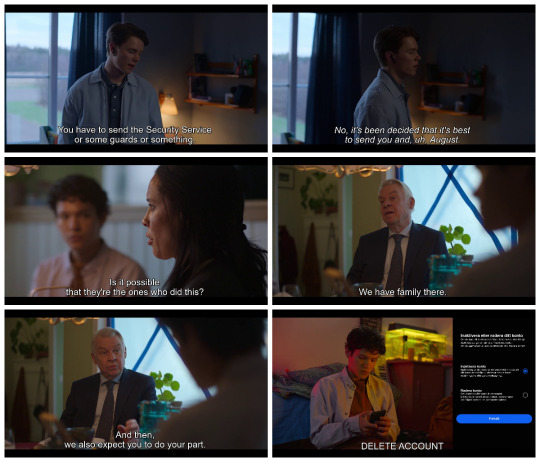
Culture: In Sweden, Säkerhetspolisen, SÄPO, is the government agency in charge of national security, which includes providing security and assigning bodyguards to the royal family.
Subtext: Note the great use of passive voice here by Farima to avoid taking responsibility for the decision to force August to join the birthday foundation event. She's also expertly bargaining with Wilhelm to get what she wants.
Subtext: We know it was the far-right assholes who posted comments to Simon's videos a couple of episodes ago.
Blink and you miss it: Jan-Olof really perks up when Linda talks about moving to Gothenburg, because that would probably mean the end to the relationship between Wilhelm and Simon, which would solve all of his current problems.
Subtext: Like Farima, he bargains with Linda and Simon to get what he wants, for Simon to stop posting things to social media. It's almost as if their strategy was to do nothing at the start, waiting for things to blow up so they could swoop in, help out, and start making demands in exchange...
Blink and you miss it: The option to inactivate and hide your social media account is right there, but of course Simon has to choose to delete everything, because it will cause more drama and anguish.
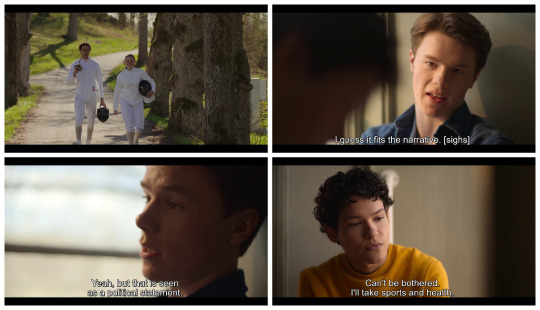
Blink and you miss it: Fencing! Woohoo! I did fencing for five years as a kid until 8th grade or something, but I only did foil, and not épée like these students. I have absolutely no idea where these two are coming from or going to though, where would they practice? Is there a hidden fencing hall somewhere on the grounds that we haven't seen yet? How many kids at Hillerska are fencing? Also, he's carrying a practice blade and not an electric competition blade, so that checks out. Of the three types of modern fencing, épée is unique in that the entire body counts as a valid target, while in foil only the torso counts, and in sabre only the upper half counts. Oh wow, it looks like the gear is now wireless and every fencer carries their own indicator lights. Cool! Back in my day you had to be strapped in with a cord for competitions.
This tumblr is now about French School fencing. Allez! Touché!
Subtext: The narrative is that it's perfectly ok for the crown prince to be gay, as long as he's not gay gay.
Culture: The show keeps saying this, but in real world Sweden it's no longer the case. Supporting los jibbities is viewed as a completely mainstream and inoffensive opinion, on par with supporting human rights in general.
Subtext: Another example of privilege is being in a position to do a lot of good, and then just not caring about it. Simon is fighting for the causes he believes in, so seeing Wilhelm just casually throw it away is extremely disappointing for him.
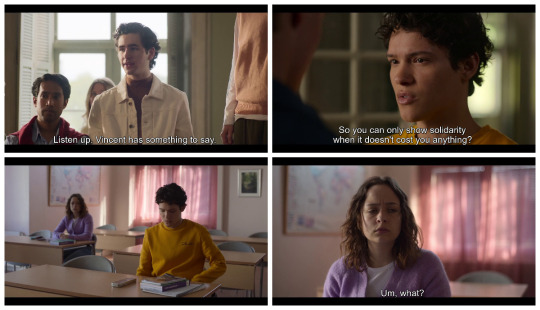
Subtext: Unlike Vincent, August is actually a natural leader, someone people listen to, which is why he manages to quiet down the room when Vincent is unable to. Maybe a good quality in a future king?
Subtext: Simon is continuing the argument from before. Wilhelm could have shown solidarity with mental health causes or LGBT causes, but chose not to. However, he immediately decided to join in solidarity with the other rich kids protesting the school rules, which is rather selfish.
Subtext: Colour theory! Sara in purple, because part of the reason she's back at school is that August asked her to? And Simon in yellow, because he sure isn't loving Wilhelm very much right now.
Subtext: Just a reminder that Sara has actually been completely out of the loop since the end of season 2. She has no idea about the school rules, what's happened at home, how it's going with Simon and Wilhelm, or what's happening at school.
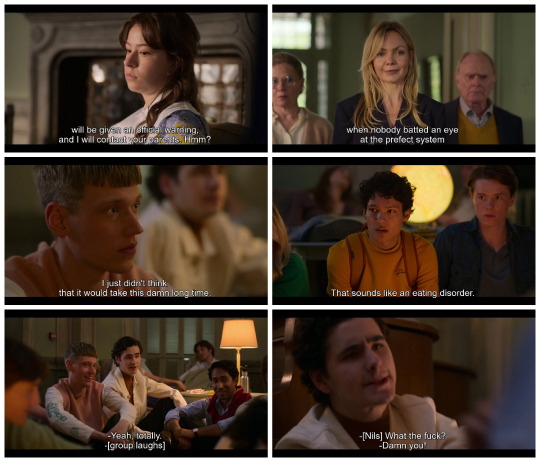
Blink and you miss it: Fredrika is so close to stop striking as soon as she's threatened with repercussions.
Subtext: I keep hammering this point home: The culture is in the walls, it's not something some of the kids made up. The visiting alumni were also hazed as new students and kept it going as third years. Same for the parents of all these kids. They're all part of the system, they all kept the cycles of abuse going, because they want the school to be like that.
Subtext: Privilege is thinking you can get things your way with almost no effort. None of these kids have ever struggled or protested something for real and then not been given what they wanted, so they seriously believed they'd win immediately.
Subtext: Another theme of this season is bringing secrets out in the open. We've all seen August struggling with body dysmorphia and an eating disorder since season 1, but no-one has ever called it out and put words on it, until Simon immediately recognizes it and calls it out.
Subtext: ...while the rich kids are just stuck in denial, because eating disorders is for poor people or something, it's not something that happens to them. And if it did, you certainly wouldn't admit it to anyone else.
Subtext: August tries to jokingly fend off Nils because he doesn't want anyone to know that the letter actually meant something to him, until Nils pushes too hard, and August punches him.
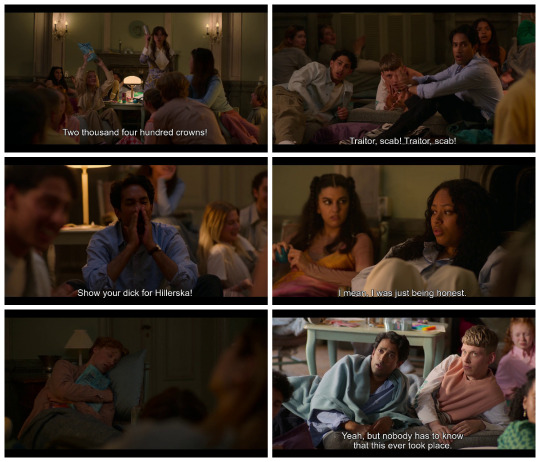
Subtext: Vincent talked a big game about striking in solidarity, but when they're caught as hilariously unprepared as they are, they're not pooling their resources in solidarity with each other, and instead resort to selling them to the highest bidder. Capitalism in a nutshell, illustrated perfectly by the behaviour of spoiled rich kids. Also, pet peeve, the English word for the currency of Sweden is "kronor", not "crowns".
Lost in translation: They're actually repeating a single word in Swedish, "svikare", which is pretty hard to translate. The verb, "svika", is a bit worse than letting someone down, but not as bad as betraying someone. The adjective, "besviken" typically means disappointed. So "svikare" means a person who is letting other people down, disappointing them, or betraying them.
Subtext: The culture is in the walls of the place, but the kids are also pretty damn complicit in continuing all the shitty traditions. This looks like a game of strip poker or truth or dare that went off the rails and just resulted in more bullying, with everyone joining in.
Subtext: The other girls are upset with Felice because she broke the code. You don't snitch to outsiders, you don't tell the truth, you keep up appearances.
Blink and you miss it: Henry won the potato chip auction, happily ate the entire bag, and passed out in a chair, clutching the bag. Mmmm, sourcream and onion.
Subtext: Speaking of closing ranks towards the outside, this also applies to this strike. It would be bad PR for the school if anyone outside found out that it happened, so it's better to solve it quietly and discreetly. Vanessa can trust the kids not to snitch. Vincent is also right, the parents, who are paying the tuition fees, are on their side.
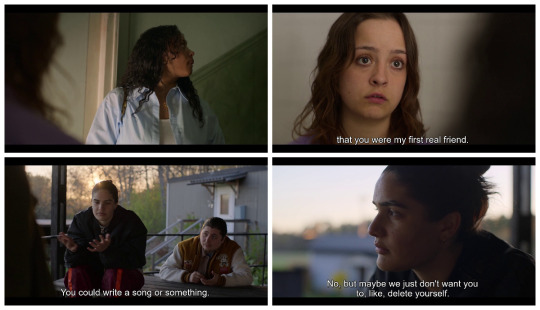
Subtext: Felice can't be seen talking to Sara, so she checks that the coast is clear, and then drags Sara into a private bathroom to have their conversation.
Subtext: Likewise, Sara was probably Felice's first real friend.
Subtext: Nice little foreshadowing. I would have loved seeing Simon's drawing though!
Subtext: Well, he could have just made his social media private, but the show has to maximize the drama, so here we are, piling on more examples of how Simon is losing himself to the monarchy, that maybe he can't reconcile the conflict.
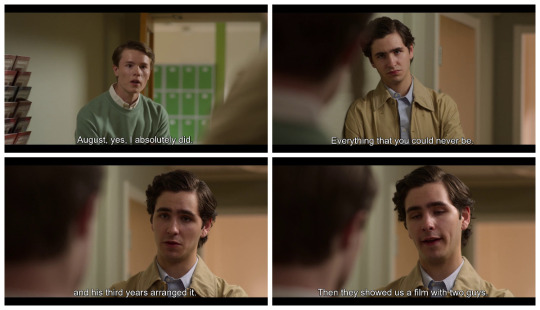
Subtext: Erik spent three years living at Hillerska, of course he wouldn't have told his then twelve year old kid brother about all the shit going on at the school. August spent an entire year living with Erik at the school, seeing what went on first hand, so of course he knows a side of Erik that Wilhelm doesn't.
Subtext: August has been trying to keep his mouth shut and avoid Wilhelm, but since they have yet another fight, he decides to drop the bomb about Erik to hurt Wilhelm.
Subtext: Again, the culture is in the walls. This is not something that only Erik's class did, once. It's probably been happening to all the boys for decades. It happened to the current second-year students, it happened to Erik, and lots of students before him who kept this shitty initiation tradition going.
Culture: Let's talk about the gay porn hazing a bit more. To me, this is an urban legend. I heard about it when I was a teenager back in the 90's, but I don't personally know anyone it happened to, or anyone who did it to anyone else. It was always hearsay, it happened to a friend of a friend's brother, or a classmate's cousin's friend or something similar, as is typical of urban legends.
Let's also make one thing absolutely clear: It doesn't work. The homophobic idea behind this shit is that if you are forced to watch gay porn and get a boner, you are gay, and if you don't, you're straight. But that is actually not true, erections don't work that way, and the fear of being found out is quite the boner killer. Also, what if you like guys, but the guys in the porno aren't your type? There's just so many ignorant misconceptions behind this idea.
I've also seen a lot of fan comments that keep playing into this ignorance; that the only reason Nils decided to stop the tradition was because he obviously failed it. Or that the only reason August is against it is because he failed, and the only reason he failed is because he's secretly not straight. No. Remember that the test doesn't work. Nils probably passed, despite actually being gay. August might have failed, despite being completely straight. Regardless of what happened, they both found it humiliating, and that is why they made a pact to stop it.
198 notes
·
View notes
Text

Since I joined the fandom, I’ve been told, repeatedly, that Astarion was evil in the past, evil when you meet him, and will be evil at the end of the game—whether he remains a vampire spawn or not. No good ending, no redemption for him; because it’s not like he suddenly becomes a saint!
Essentially, he’s talked about as if he were a monolith. Static. Unmoving. Frozen in place.
Well, at this point, I feel the need to say how I see it.
First of all, the concept of the corrupt magistrate is outdated—it doesn’t exist in the game. Maybe it was an early draft of his background that was later scrapped. But in the actual game, there’s no mention of it—no character, no note, no book, not a single thing that references this.
And given how important that detail would be for his characterization, I don’t see why Larian wouldn’t have included it, even as an offhand remark.
What we do know about Astarion before becoming Cazador’s vampire spawn is that he was a magistrate, and that the Gur beat him to death over a law he had passed against them. That’s it.
Personally, I think this ties into his previous position of privilege, prejudice, and the fact that he was likely a tedious, meticulous, and inflexible magistrate—but ultimately, that’s just my own inference based on scattered dialogues.
The truth is, the Gur could have been wrong.
We’ll never know!
Just like we’ll never know what color his gorgeous eyes were before they turned red.
Now, I’m going to shift to a slightly more technical perspective—but I promise I won’t go overboard!
The Astarion from Act 1 cannot be the same Astarion at the end of the game, regardless of whether he ascends or not.
And here’s why.
In basic screenwriting, we talk about a character’s transformation arc. If there is no change, there is simply no story—because the character would be nothing more than a rubber figure on whom events, decisions, and other characters bounce off without leaving a trace. It wouldn’t be engaging, nor would the character have any real drive to act.
This is a vast topic that I won’t go into in detail, but if you’re interested, just type character arc into a search engine, and you’ll find a whole world of information.
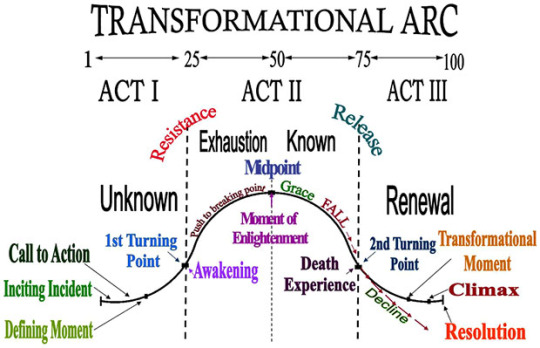
Do you think stories and characters are written purely by feeling? There are countless manuals that explain the rules of good storytelling. (Dara Marks, considered the best American story editor, formulated the rules outlined in her renowned manual, Inside Story: The Power of the Transformational Arc.)
And characters follow writing principles—Astarion included. And creating a believable character while following these rules is really complicated—so every time someone says that Astarion is a monolith, somewhere, a screenwriter dies.
It’s just not possible, folks—there’s no chance that Astarion stays exactly the same throughout the entire story. He has to grow. Or regress.
Either way, he cannot remain unchanged; otherwise, The Pale Elf narrative arc wouldn’t exist.
It’s the fundamental rule of storytelling—straight from the rulebook.
Now, let’s clarify the concept of redemption a bit.
In religion, redemption is the forgiveness or absolution of sins and protection from damnation and misfortune, whether eternal or temporary. The Catholic Act of Contrition is a profound and meaningful prayer, considered the first step toward redemption. It allows believers to express their repentance and willingness to change after committing a sin.
From here, the term has come to be used in a more general sense to refer to the attainment of physical or moral freedom through liberation from guilt and sources of unhappiness.
In a literal sense, however, redemption means salvation, remedy, or escape.
So, yes, the vampire spawn ending is a redemption arc—not because Astarion suddenly becomes a saint, for god’s sake, but because he faces his past, everything he has done up until that moment and the people he has harmed, and does so as a hero, sacrificing himself for the greater good.
(Yes, one could debate whether releasing 7,000 starving vampire spawn into the world is truly the greater good, but within the context of the game, its setting, and Astarion’s narrative arc, it is.
Wyll—the group's hero and a monster hunter—explicitly says, "They are victims just like you, Astarion. They deserve freedom too."
Many of the good-aligned companions also disapprove of their extermination, and depending on their oath, even a Paladin Tav/Durge can break their vow and become an oathbreaker if they choose to kill them all.
So, the game itself strongly suggests that freeing them is the most humane and morally right choice—especially for Astarion.)
So, to summarize, it is a redemption arc because Astarion takes responsibility and atones for his actions, for his sins. He acknowledges the harm he has caused and repents, embraces the pain of others beyond his own, and gives them the freedom that he himself had once taken from them.
That’s what redemption means, not that he becomes a saint by the end of the game.
Not only that, but Astarion also makes peace with the Gur, who will stop hunting him—not out of laziness, but because he has proven that he has changed, that he has grown, and that he is no longer a threat to innocent people. (And they also accept the release of the spawn, despite being monster hunters—take note!)
It’s no coincidence that Astarion tells his brothers and sisters that they can choose between being parasites hiding in the shadows or something more than what Cazador created them to be.
But either way, the consequences will be on their heads—because actions and choices have weight.
And you reap what you sow.
And here, I’ll take a small detour, because the first person to bring up the concept of redemption is actually Ulma, with her words: "But it would be a start—you could still be redeemed."
She later reinforces this idea in one of the most powerful scenes in the game, when—after the ritual and Astarion’s absolutely heart-wrenching explanation of why he took the decision away from them regarding their own children—she tells him: "I never thought a vampire spawn could find redemption… but yes, you will no longer be hunted."
Of course, Astarion is still a vampire. He still has instincts and needs. He likes hunting, killing, and yes, instilling fear. A little, as he puts it.
The difference is that instead of doing it indiscriminately, he directs his attention toward criminals, toward those who harm others. Just like the Emperor.
Even Karlach Mind Flayer redirects her hunger toward a specific category of people—ones who might even appreciate her intervention.
It’s called killing two birds with one stone.
And here I return to the technical side of storytelling—Astarion’s transformational arc is complete, and at this point, he falls into the archetype of the anti-hero: a protagonist in a story who may lack some of the traditional hero’s qualities, such as idealism, courage, and morality.
Typically, an antihero is a rebellious or tormented character with clearly negative traits who often employs questionable methods. However, they should not be mistaken for a villain, as they do not fully descend into evil or possess enough heroic qualities to earn the audience’s sympathy.
However, considering the general setting—where even heroes kill as if there’s no tomorrow and punish villains with brutality—just look at Selûne’s demigoddess daughter, Lady Aylin—I don’t see anything strange or horrific about feeding on criminals.
Quite the opposite.
To conclude, the concepts I’ve mentioned are not something I made up from scratch—they’ve existed for ages.
Astarion’s evil ending is clearly ascension, which, following the rules of good storytelling, still adheres to a transformational arc compared to Act 1 Astarion.
By extension, Act 1 Astarion is different from both the Ascendant Vampire and the Vampire Spawn in the final outcome. The monolithic character does not exist in any story worthy of being called one. And Baldur's Gate 3 is a masterpiece of writing.
#astarion#astarion ancunin#baldur's gate 3#bg3#bg3 astarion#baldur's gate#baldurs gate 3#baldurs gate#baldur's gate astarion#baldurs gate 3 astarion#astarion bg3
44 notes
·
View notes
Text
Family, Blood Ties and Redemption in Pokemon Horizons
I really felt for Amethio in episode 65. Spinel will do anything to get rid of him, huh? I can definitely see Amethio joining forces with the rvts in the future, either as a member or as an ally.
I want to call this a 'redemption arc' but I don't even know if that's the correct wording. Amethio is not being redeemed because he was never bad to begin with. He is a kid who has been manipulated by his own grandfather. I think this really showed during his conversation with Liko, where he said that his goal is to simply fulfil Gibeon's wishes. In addition to this, Amethio has shown numerous times to care for other's safety, regardless of whether they side with him or not (ie. When he saved Liko from Rayquaza's attacks in episode 45, and when he subsequently teamed up with Friede.) In other words, Amethio is a good person who has been taught to do bad things.
In this sense, Pokemon Horizons highlights both the importance of family and the dangers of blood ties and manipulation. The rvts are a family who care for and trust each other. Meanwhile, the Explorers are built from selfishness, deception and greed. Amethio does what Gibeon demands because he is his grandfather. When someone close to you treats you badly, it can completely bypass you because you care about them and their behaviour becomes normalised. Amethio seems to have been raised with the Explorers, so it's no wonder why he has been so loyal to them. As a result, Gibeon has been able to use Amethio for his personal gain. It reminds me of N's dynamic with Ghetsis in Pokemon Black and White.
Out of context, I found it funny how the plot of this episode was Liko and Amethio trying to get out of a cave. Whether that was a reference to Plato's analogy of the cave or coincidence, who knows. Either way, Amethio has seen the light (literally). He has seen Gibeon's true colours, Spinel's real intentions, and gained insight from Liko.
If Amethio does switch sides, I don't think this will be immediate. As he said to Liko, he is on a different path to her. Even though he is banished from the Explorers, he has still been loyal to Gibeon for so long. It makes me wonder what really happened to his Dad- did he willingly leave the Explorers or did he 'disappoint' them in the same way that Amethio did? For now, Amethio needs to decide whether he's prepared to join the other side, even if it means completely betraying his grandfather.
#pokemon horizons#episode 65#anipoke spoilers#amethio#gibeon#the explorers#spinel#liko#the rising volt tacklers#anipoke#pokeani
67 notes
·
View notes
Text
Ways to make a Dale Dimmadome redemption work:
Hi! So, as a self proclaimed Dale Dimmadome redemption truther, I wanted to make this post explaining why a redemption is, in my opinion, very much possible. (I am not nearly as confident about this as I am pretending to be)
Buckle up, this'll be a long one folks!
First, why do I think a Dale redemption could happen? Let's go through it:
It's still a kids show. I find the conclusion to the story that Dale will never love his son a bit grim for a show for children. You could of course make it work by using the found family trope with Peri instead, plus there are plenty of kids shows that have used the evil father of secondary character/antagonist trope, without the father getting a redemption but I do think a Dale redemption is the most satisfying conclusion for this show.
Even Remy Buxaplentys parents started caring for Remy at some point, so I got hope. Though to be fair, they were incredibly one note.
His past with Vicky makes him a bit more sympathetic. Knowing what he went through in his childhood, it makes sense he probably wouldn't know what a child needs. I'm just saying it means there's room for improvement
He emotionally neglects Dev, but his physical needs are met. Which is something, right? Like Yay... And all...
We don't know if Dale doesn't love Dev. I think there's a possibility that he does care but just doesn't know it because he's taken his child for granted. That's not an excuse of course, but it would make a redemption more plausibel. If Dale genuinely does not love Dev whatsoever, I'll give up on my redemption hope.
How could they pull it off, if at all?
Assuming that Dale does love Dev, deep deeeep down, and just doesn't realize it because he's so focused on his company, the best way to show this is through a choice.
Dev doing things that benefit the company has never helped their relationship, Dale just gets happy because Money and it doesn't make him appreciate his son more, Dev just becomes someone useful to him.
But if Dev causes Dale to lose money, that's a good start to see what Dale truly prioritizes deep down.
Dale choosing Dev over his company is what I need if they decide to redeem him. I need Dale in one way or another show us that he truly cares. Maybe have Dale spend so much money to find and save Dev, that his company goes bankrott? Or have his company explodes and Dale's main concern could be Devs wellbeing. Or Dev goes behind his father's back and intentionally hurts the company, but instead of lashing out at Dev, Dale reflects on himself.
Now... That's all incredibly out of character for Dale and I would hate for an unearned redemption. I'd need there to be a lot of build up to that moment, some foreshadowing that hints at Dale not feeling entirely indifferent about Dev. Small moments, nothing too grand. Maybe he'd be worried if he finds out that he had left Dev with Vicky at one Point, and that could be the catalyst to show us that he isn't as awful as we were shown previously.
And after we had enough of those moments and already have a feel that Dale isn't all uncaring, we get to the grand moment where Dale shows us through his actions that in truth, he cares far more about his kid than his cash. It would feel earned and not be out of nowhere then.
Now before yall call me delusional, I know that this is extremely unrealistic and I'm just setting myself up if these are my expectations. Good thing they aren't. I do expect Dev to have something equivalent of his father's love at the end of the show, but that's it.
Here are some examples of what I actually believe would happen:
Hazel and Dev become friends (again) but this time their friendship is explored more. Maybe Dev also befriends Hazel's friends and finds fulfillment through that. (although I think that'll happen regardless and would be unsatisfying if that was all we got)
Involving Peri in this mess and giving him a character arc of his own would work as well. He realizes that Dev doesn't need a Fairy to be happy because, as Cosmo said in the finale, what Dev truly wants isn't something he can get through wishes. Dev, being super rich, is already used to getting "stuff", but love isn't stuff. So Peri basically becoming a parental figure for Dev, which is what he is supposed to be as a godparent anyway, could work. Besides, Peri already solidified himself in this role in the finale when he told Dev that he cared about him. It was a heartwarming moment. We all loved it so ofc we would want more of that.
Anything involving Irep, another Fairy or even Timmy. Dev needs someone that cares for him. My top three go to characters are obviously Peri, Hazel and Dale, but they're not the only ones that could fulfill that role. We just need to wait and see what the writers do.
So yea, a Dale redemption is my first pick for a season 2 finale (or technically my first pick is a hint at a Dale redemption in the s2 finale and the actual redemption happens way later because slow burn) but I do understand that it's pretty unlikely and would be very much satisfied with Peri becoming his godparent with Emphasis on parent, or even the power of friendship with Hazel, though that'd be harder to execute without it feeling cheap (I got faith in the writers)
So this was very long. And I am going to sleep now. Thanks for reading.
#dale dimmadome#dev dimmadome#fop peri#fop dev#fop dale#fop a new wish#fairly oddparents a new wish#fairly oddparents
72 notes
·
View notes